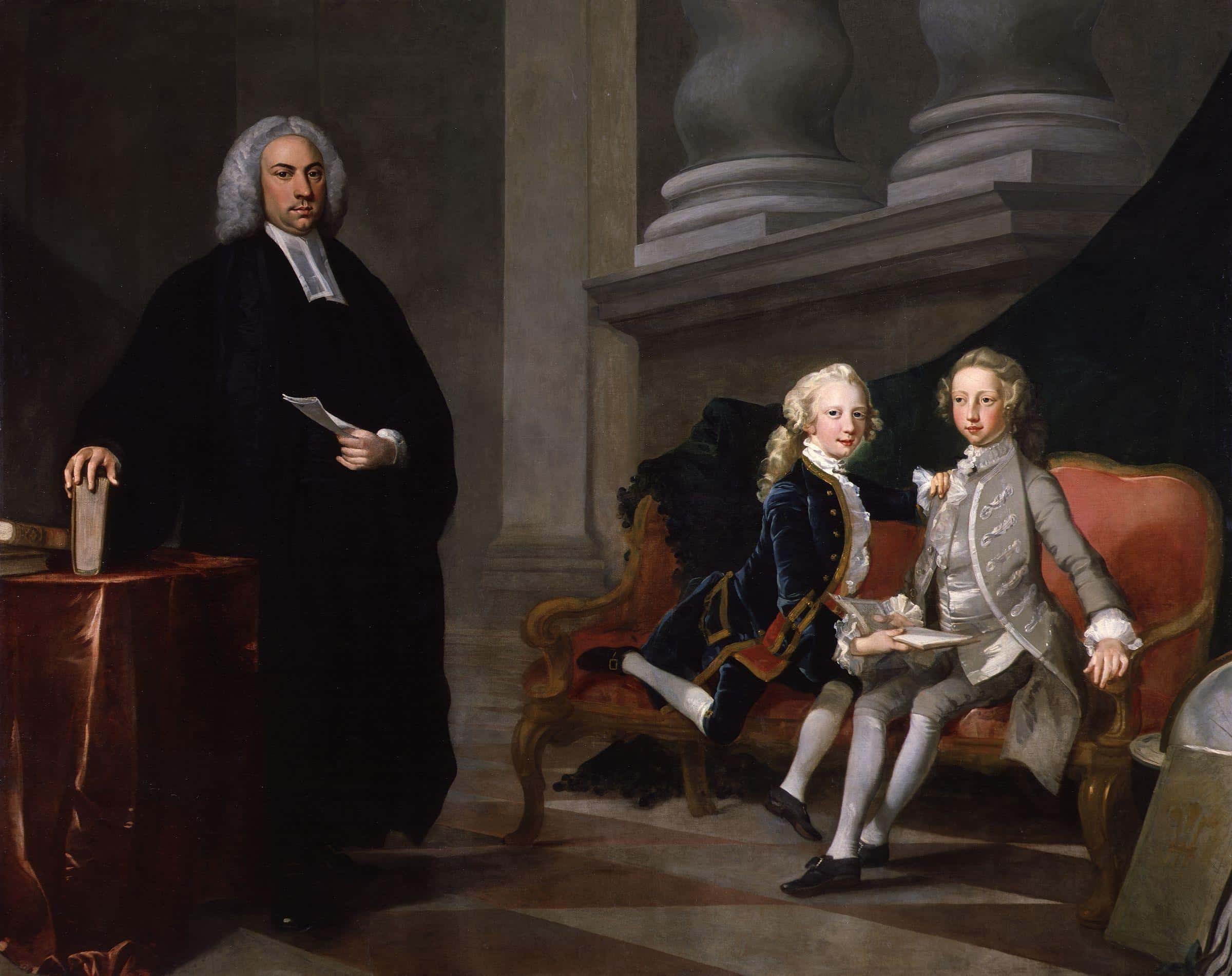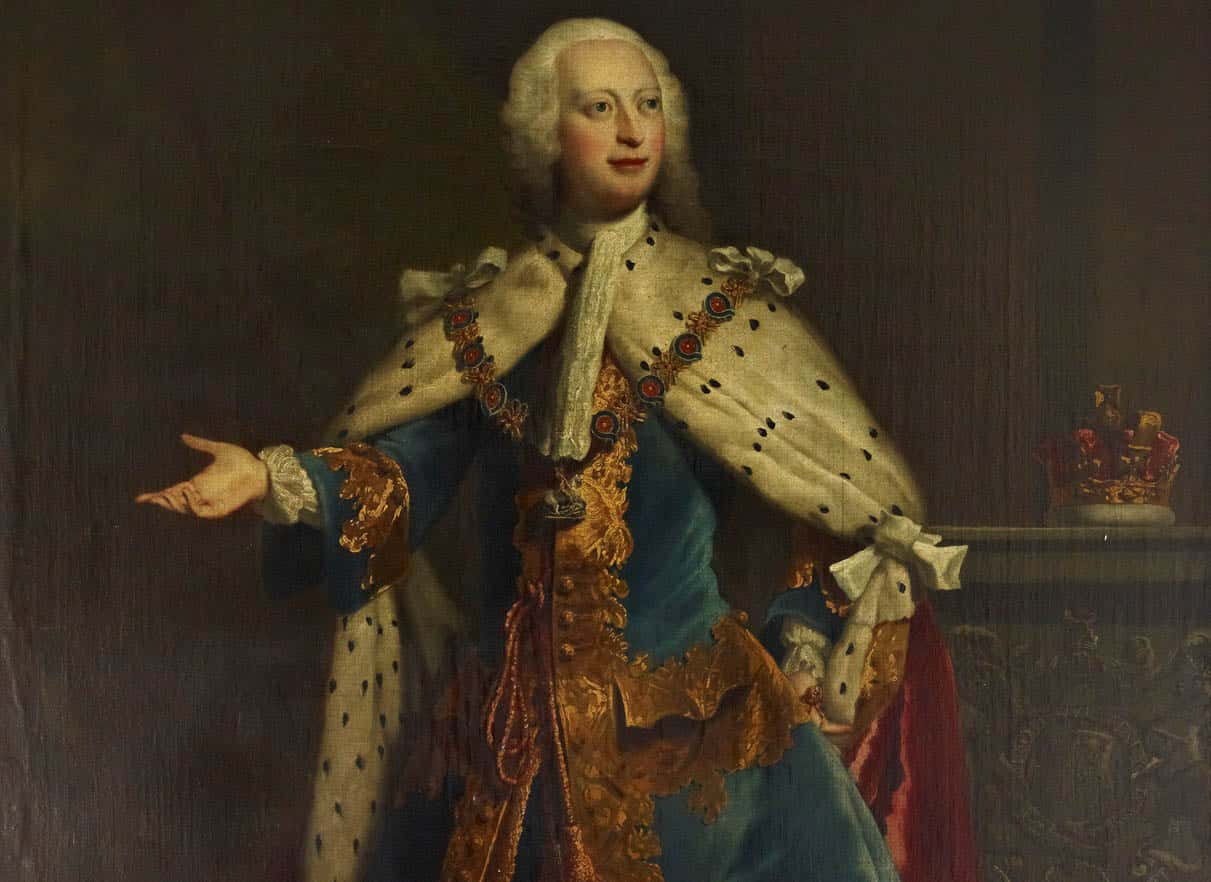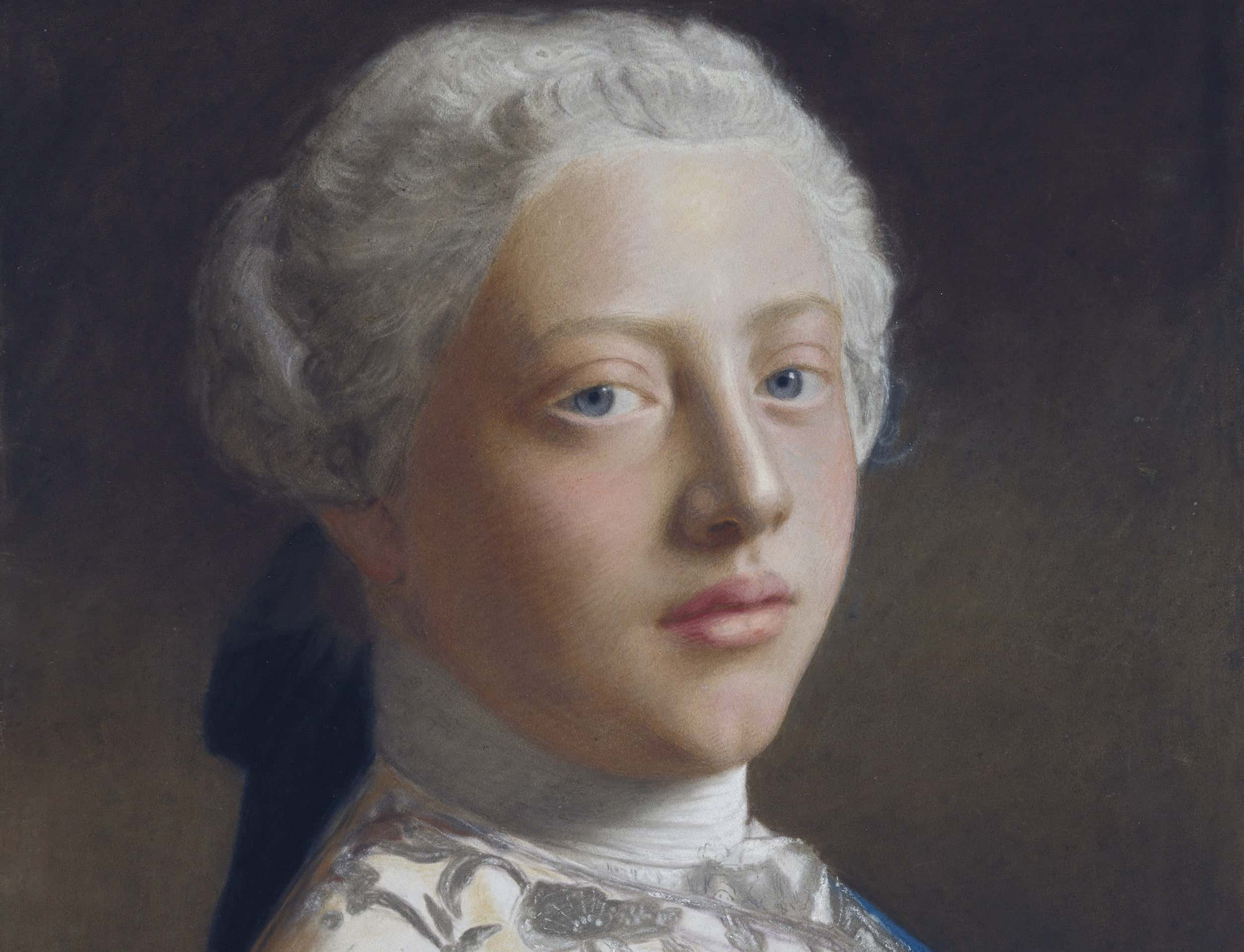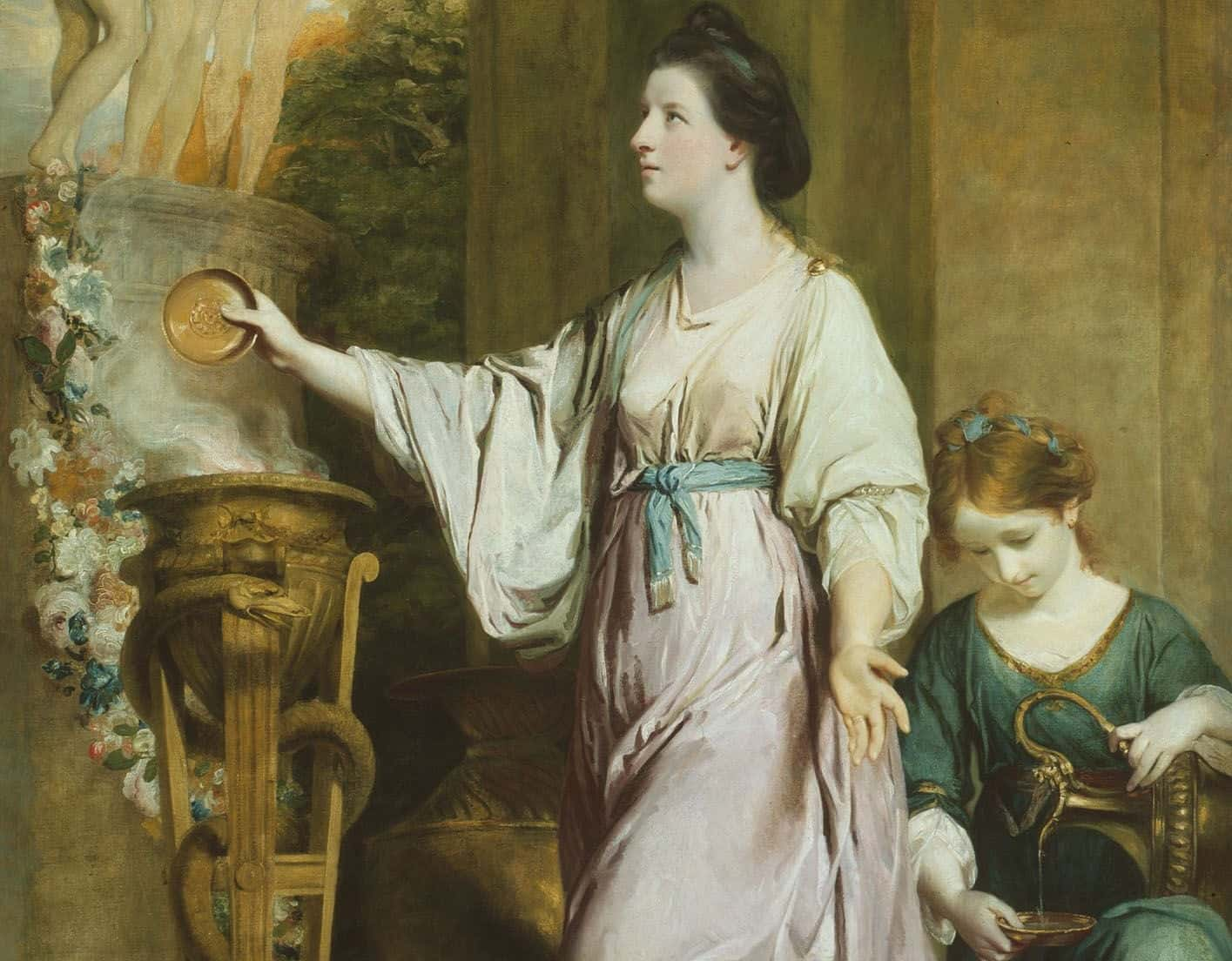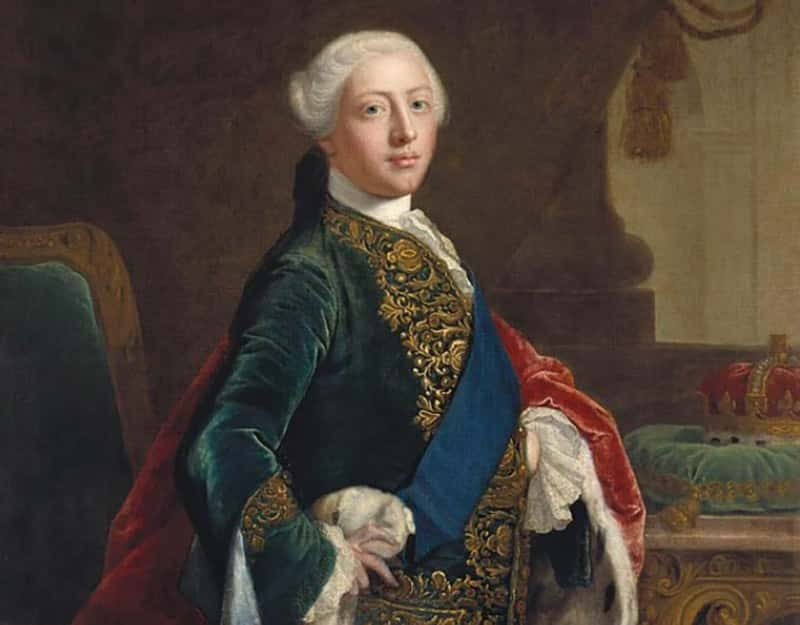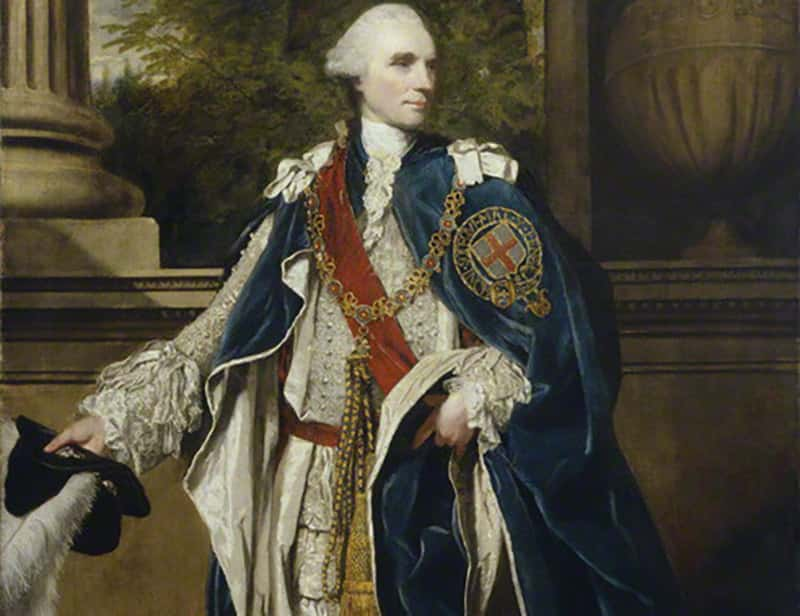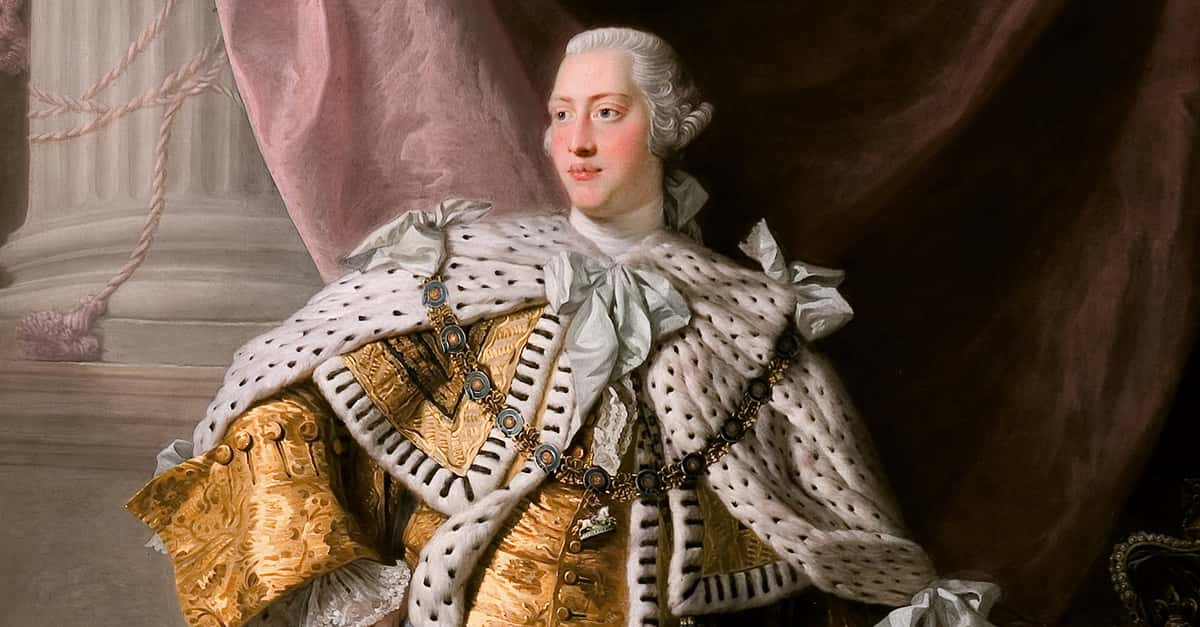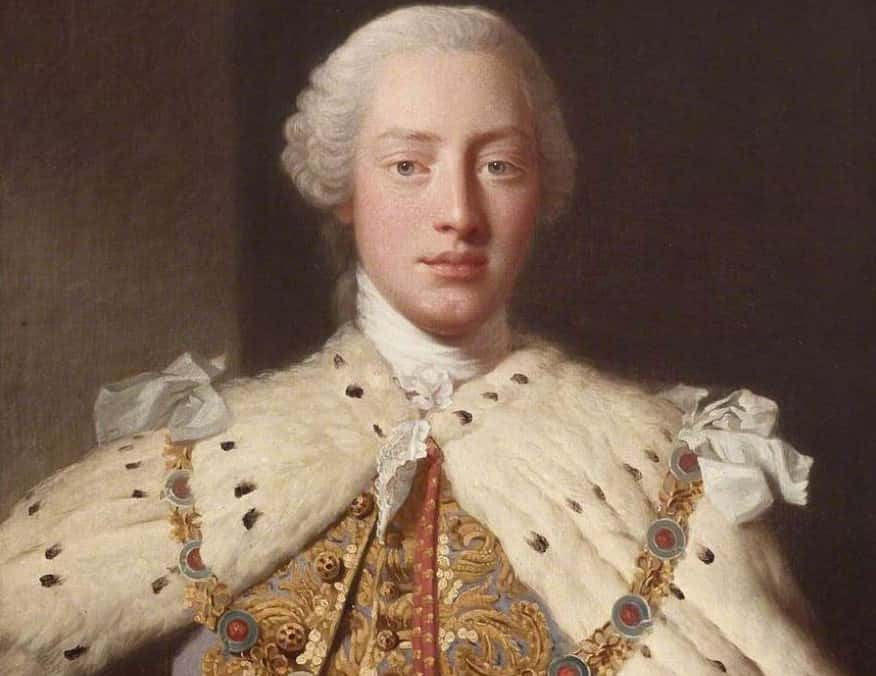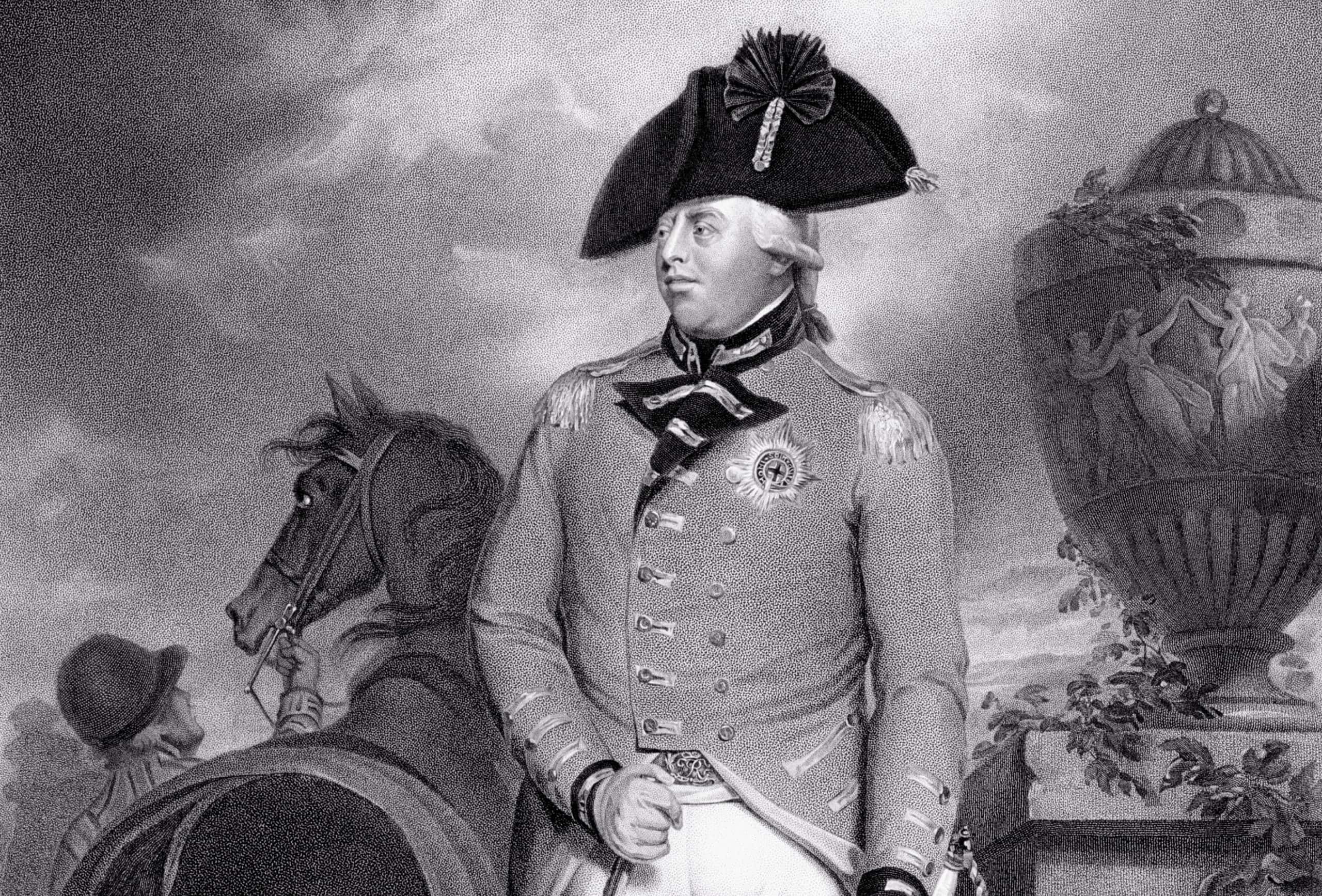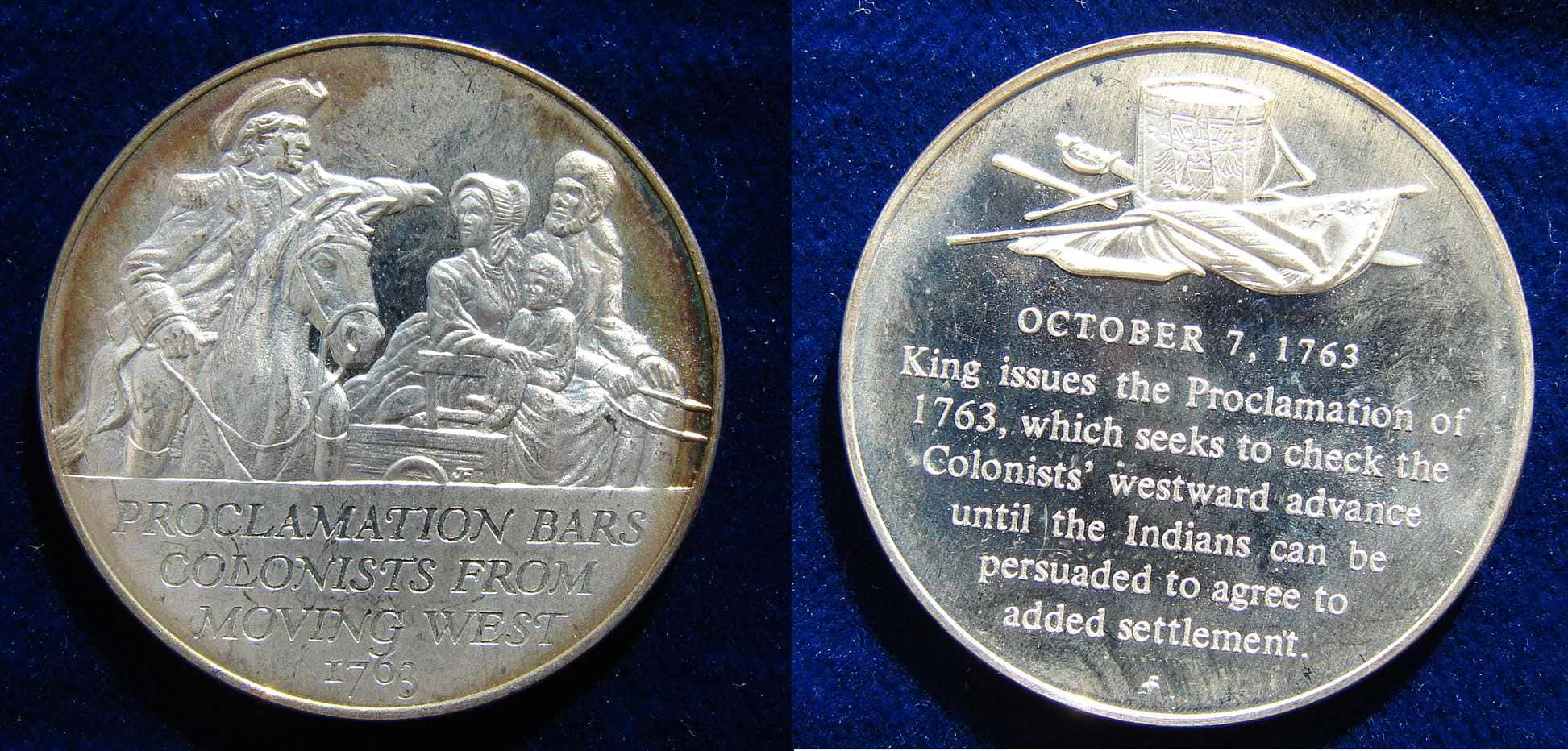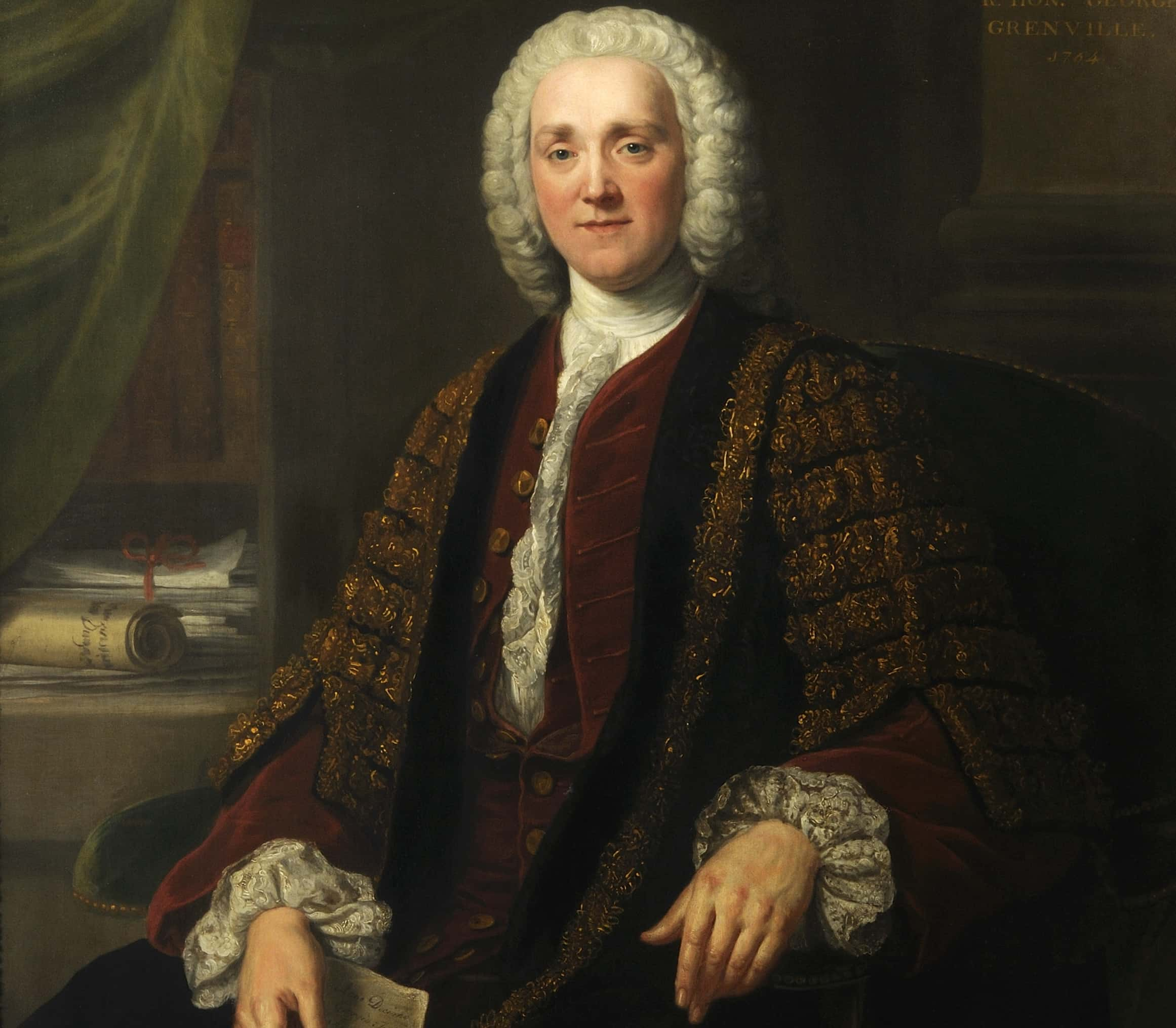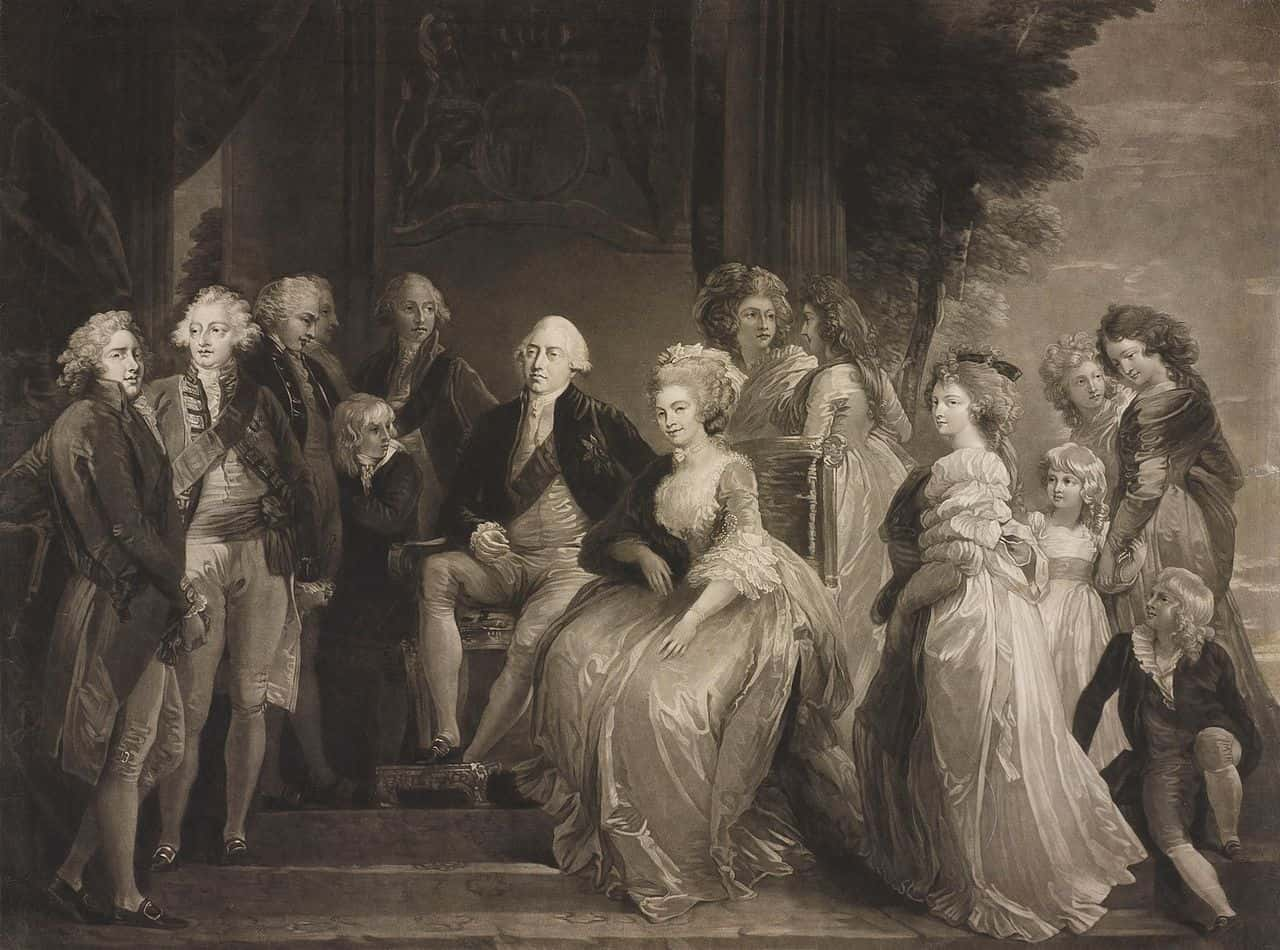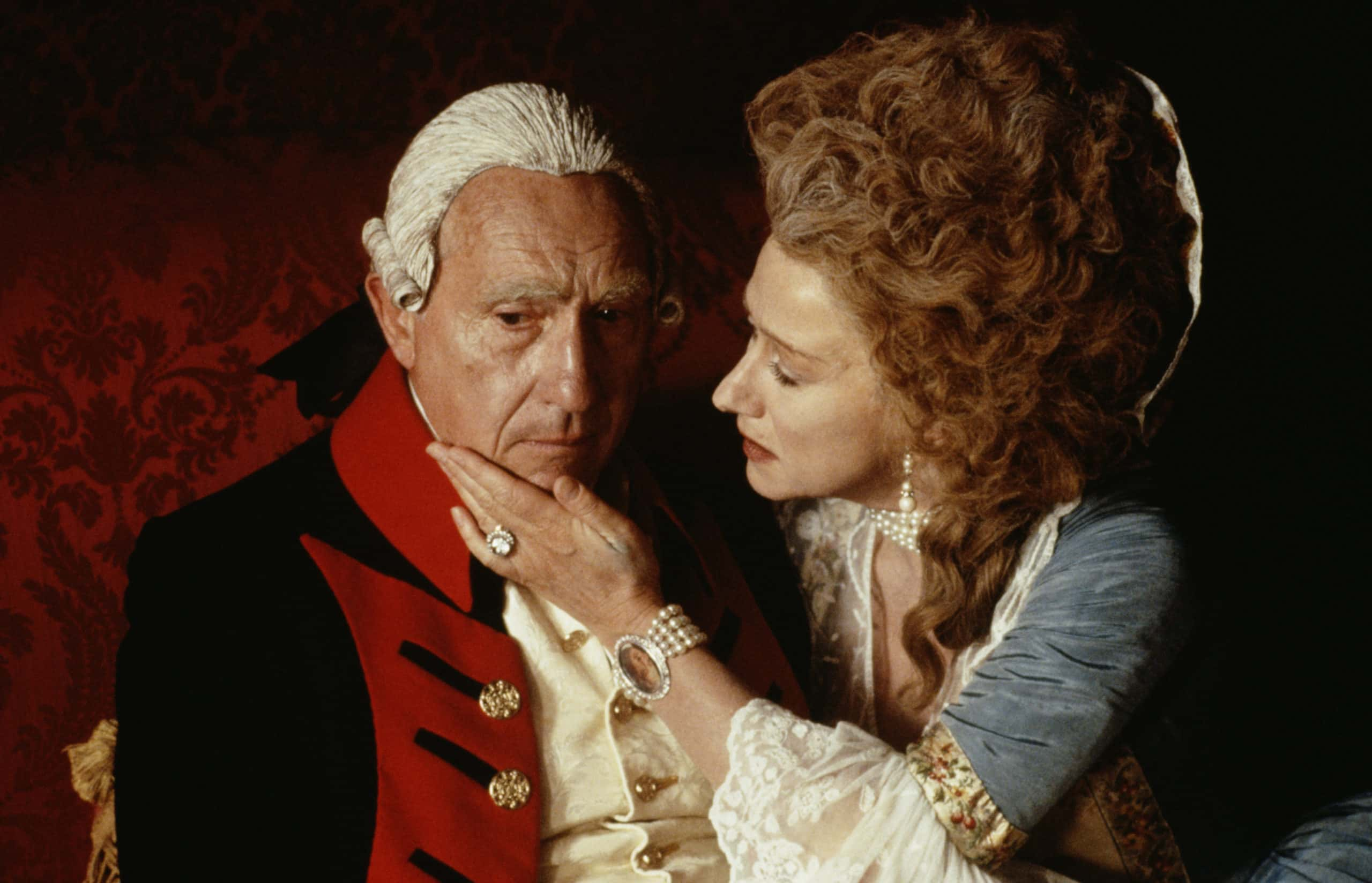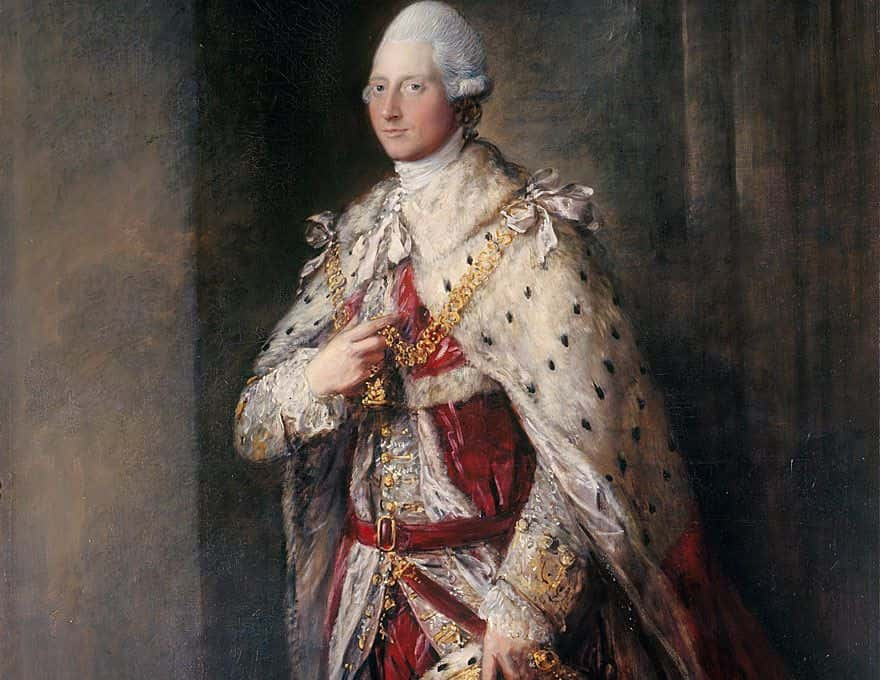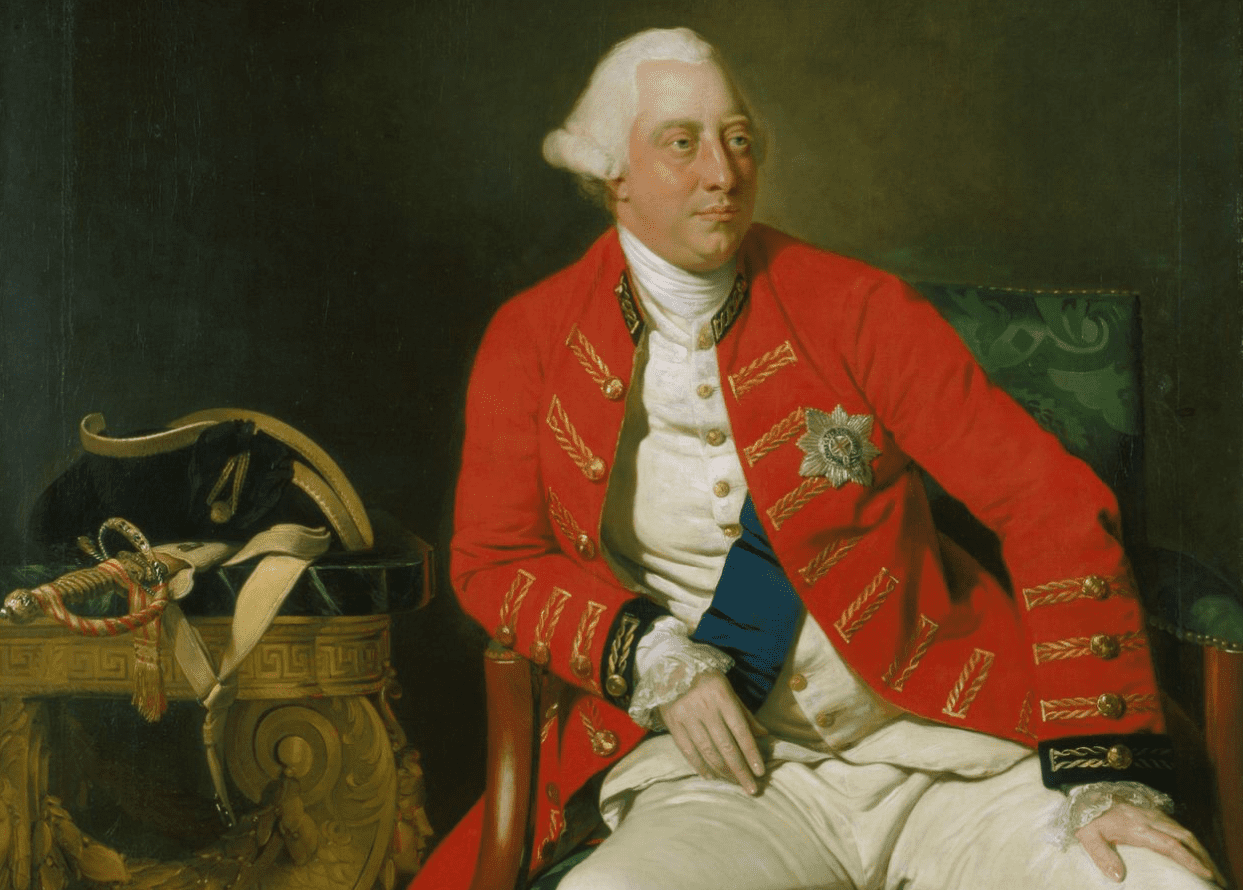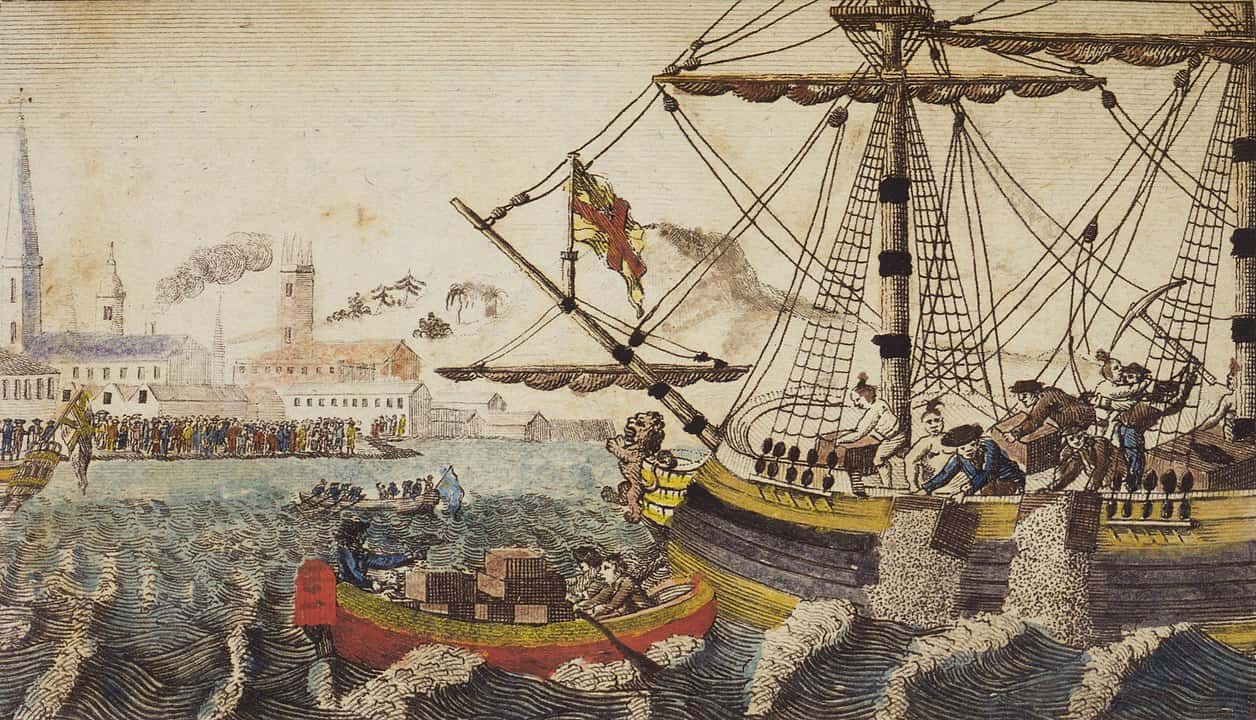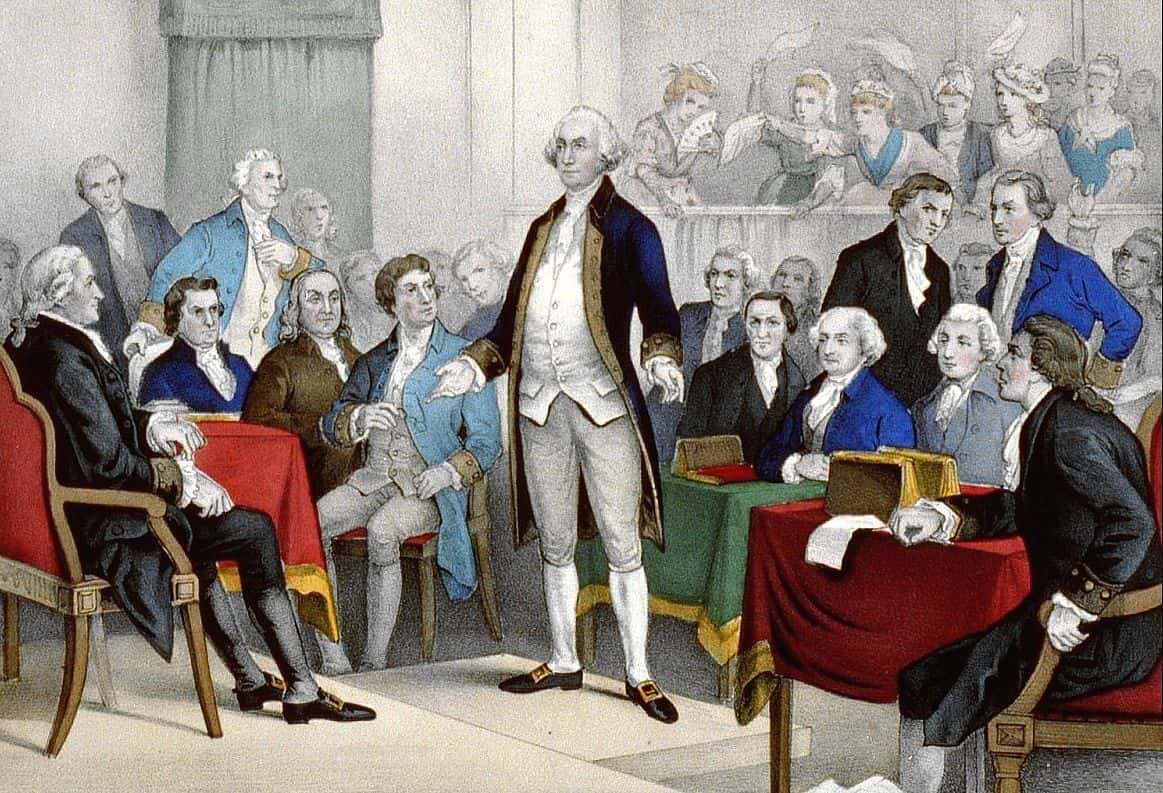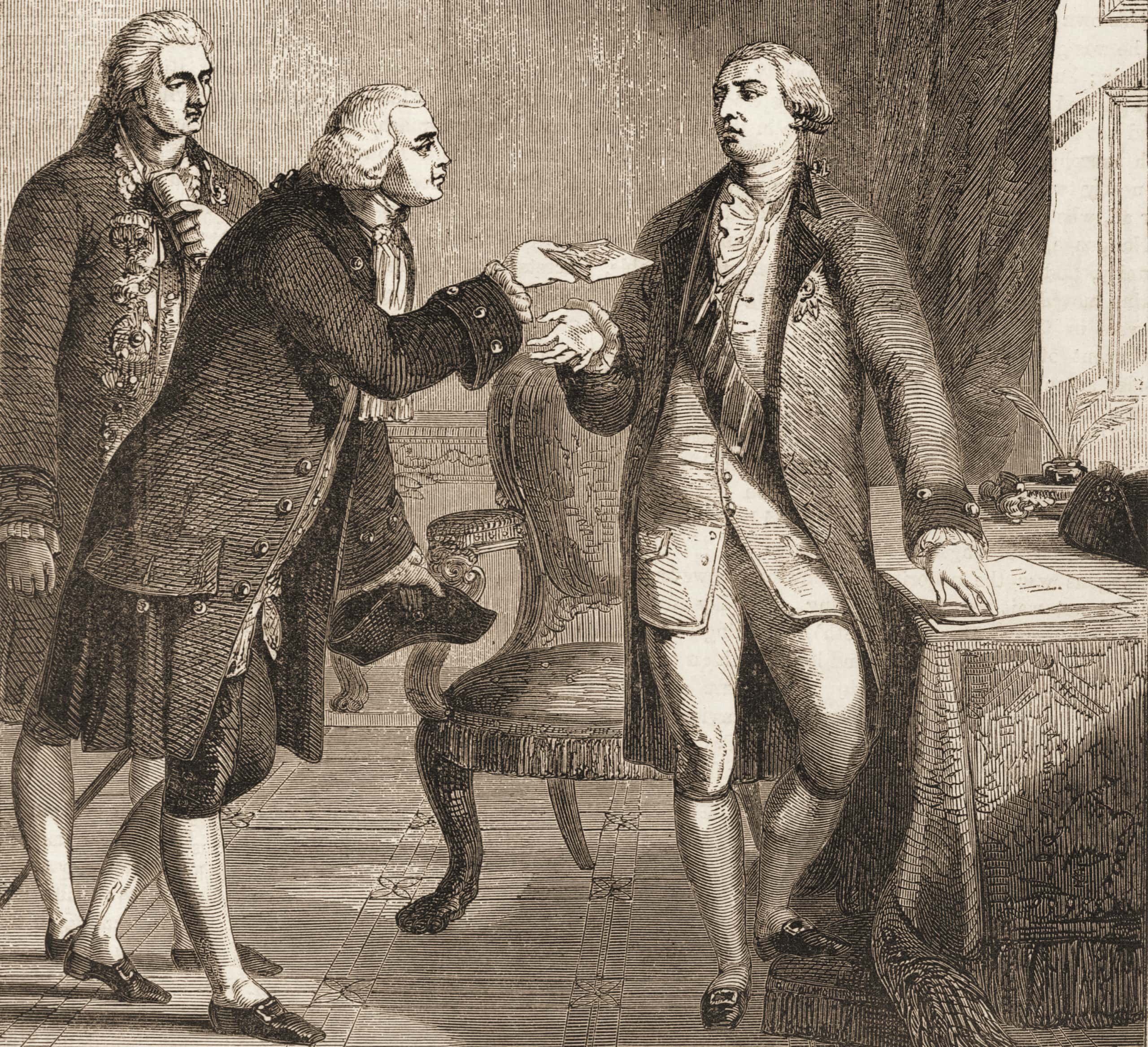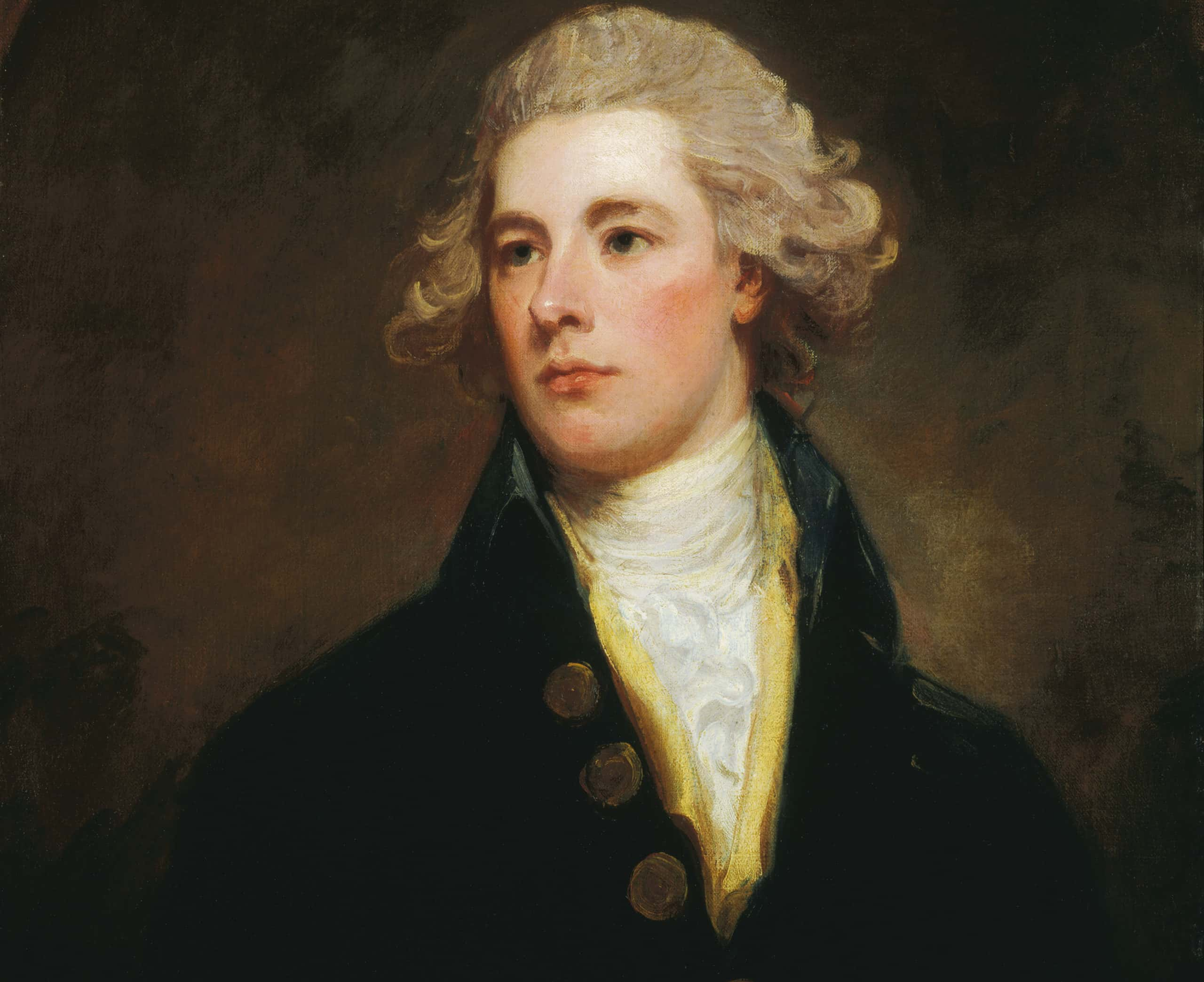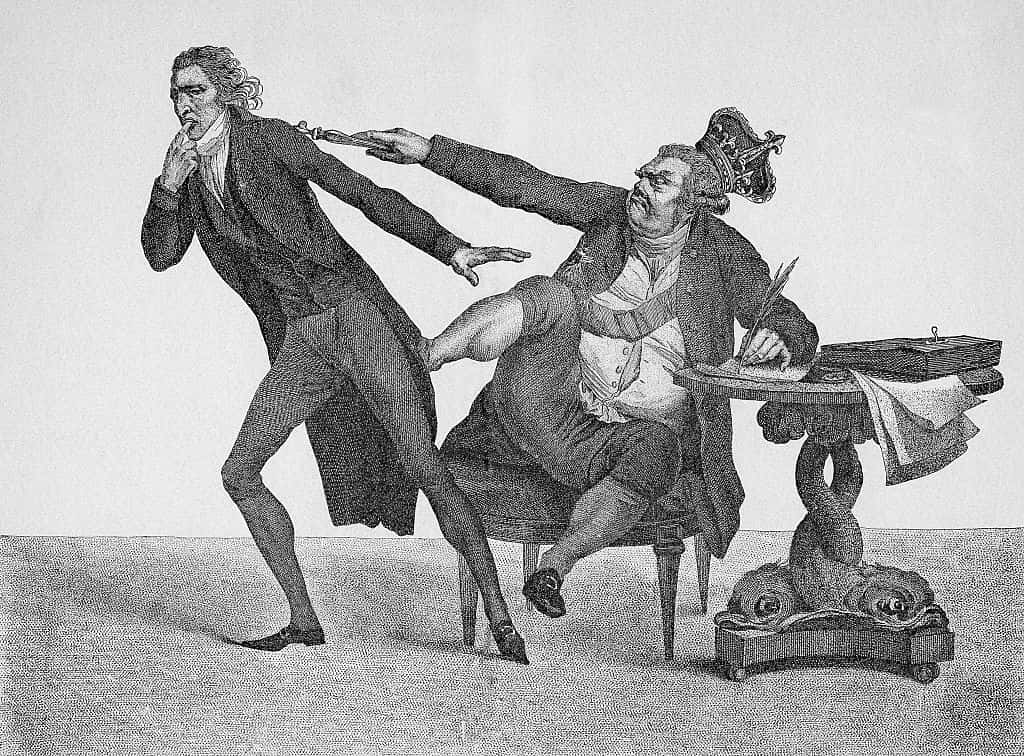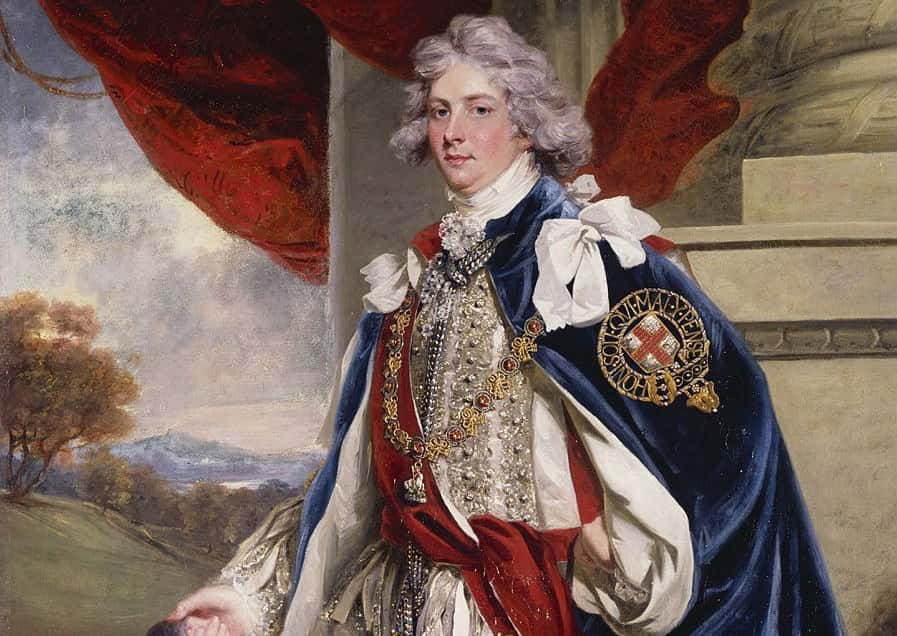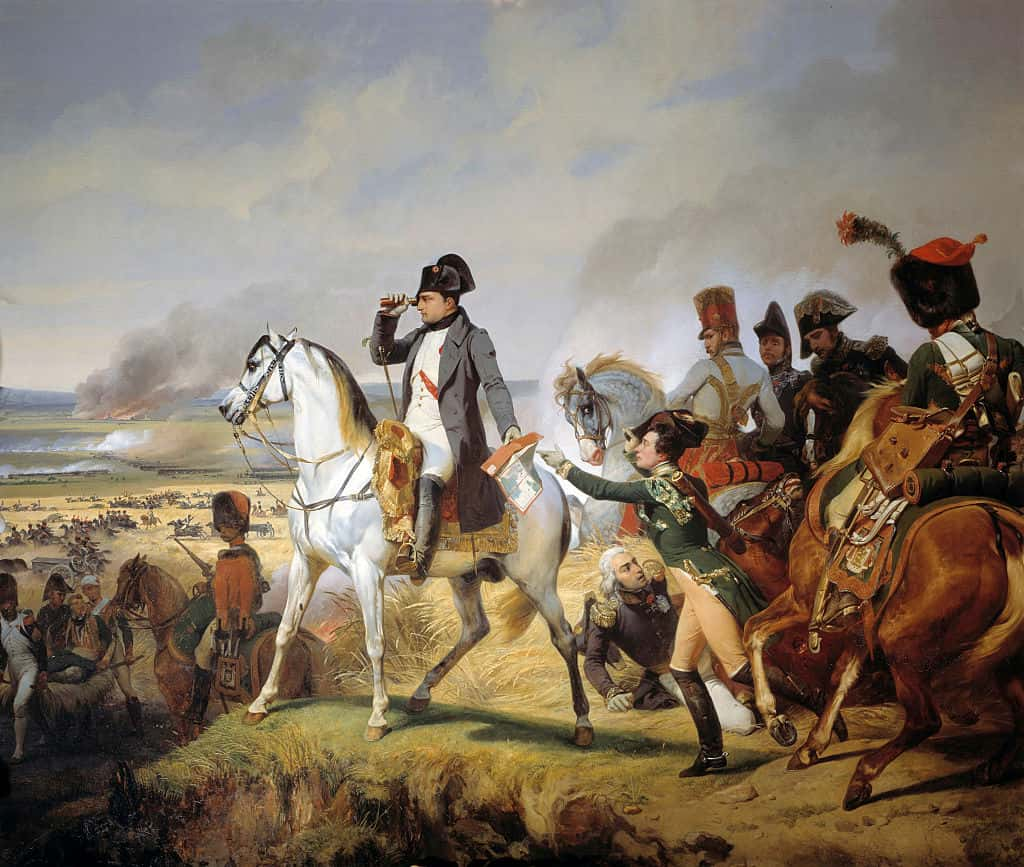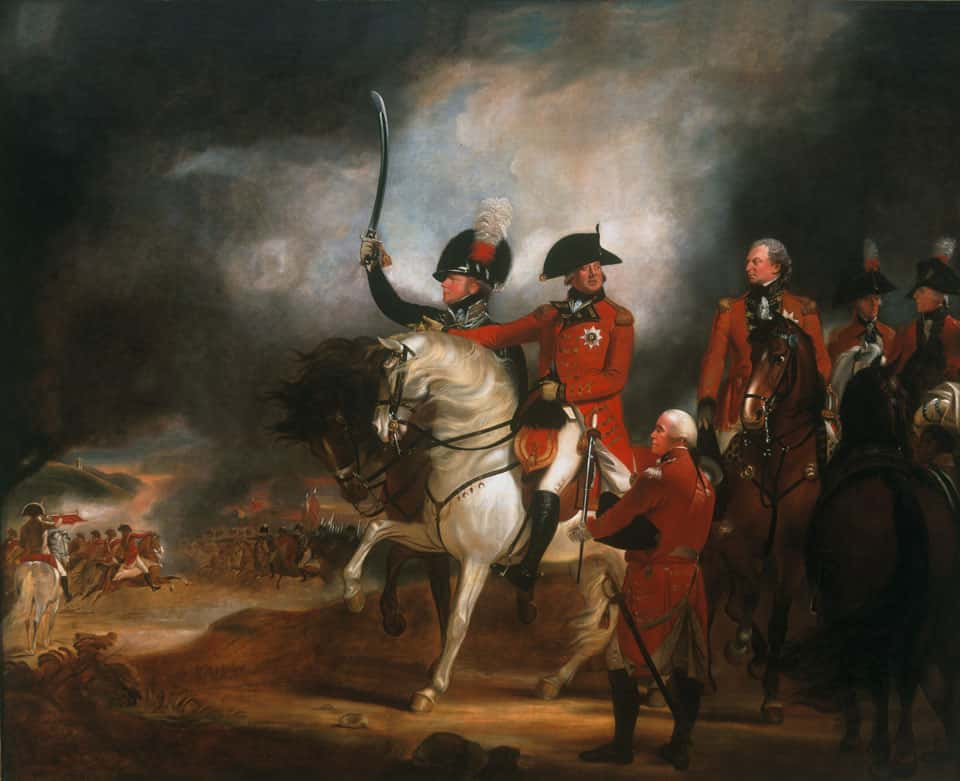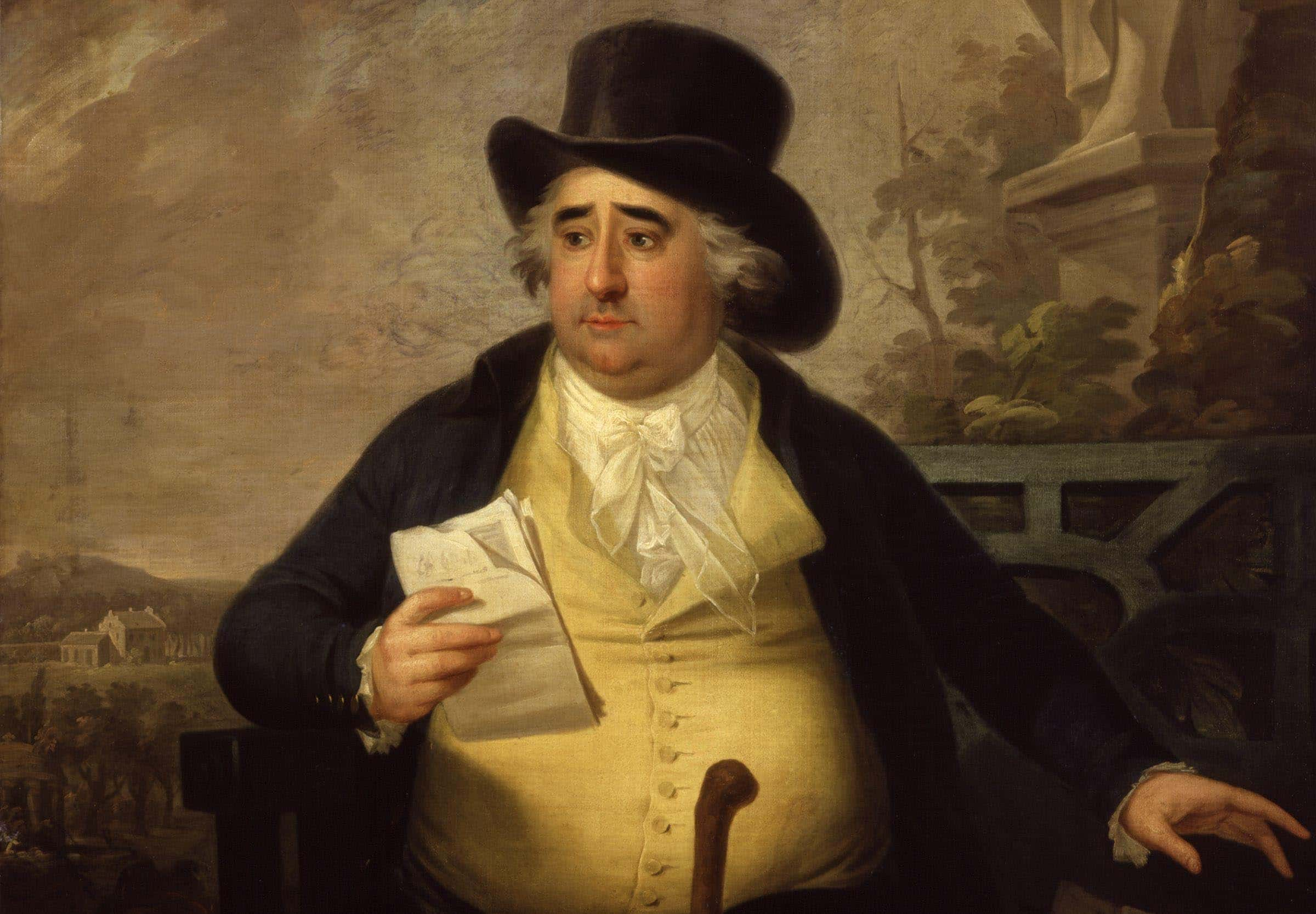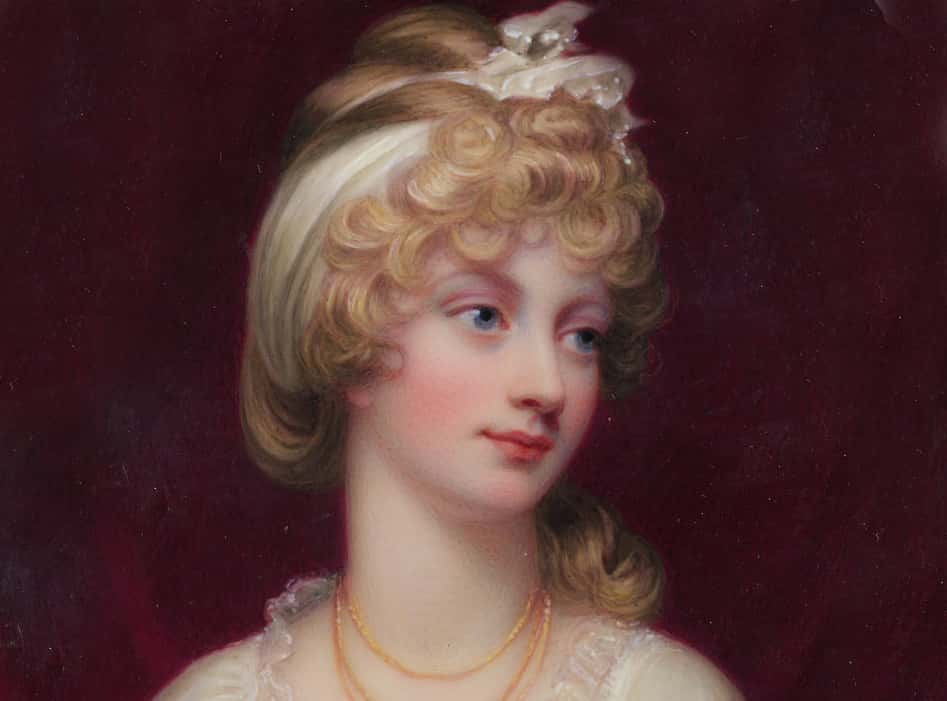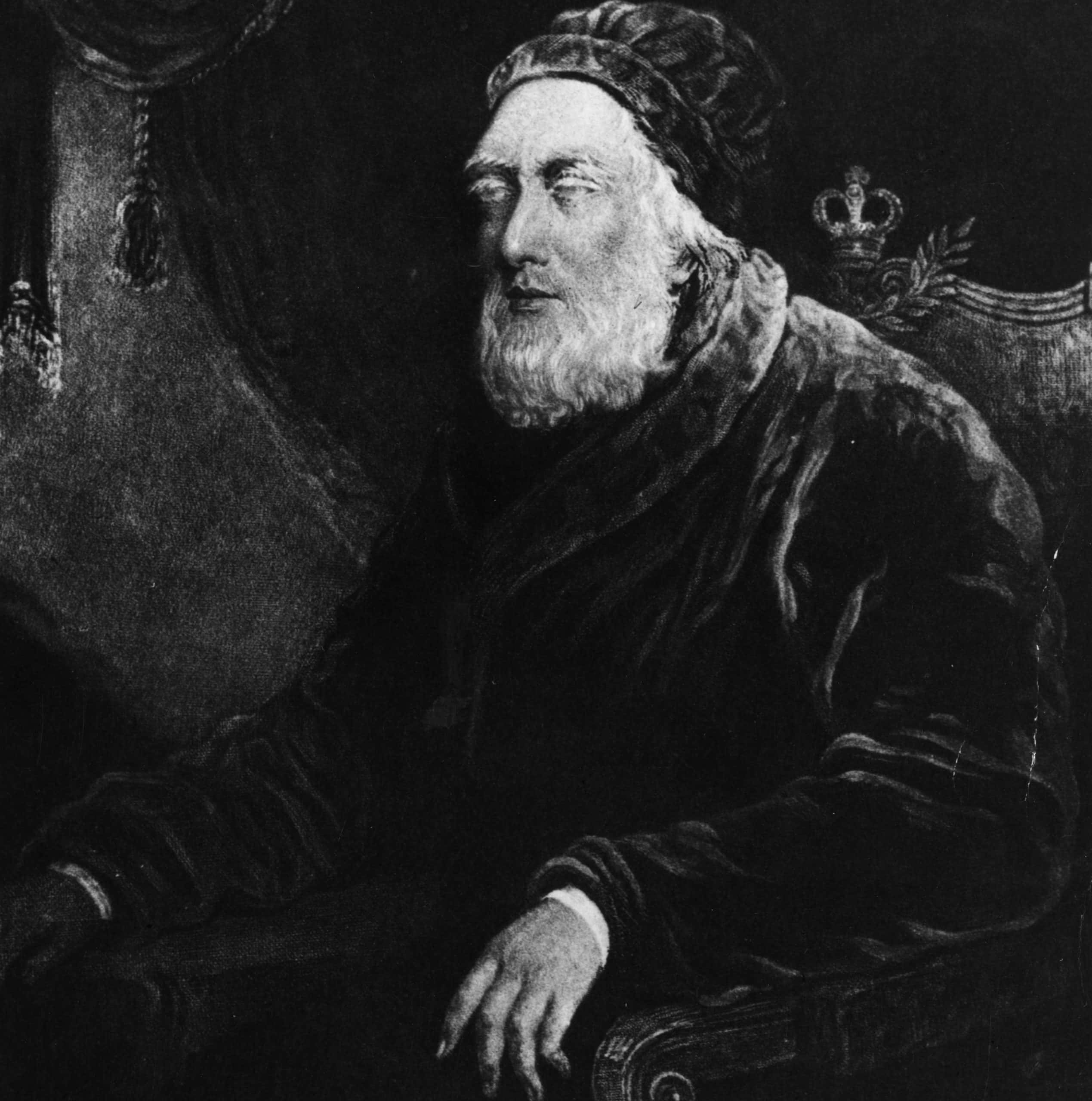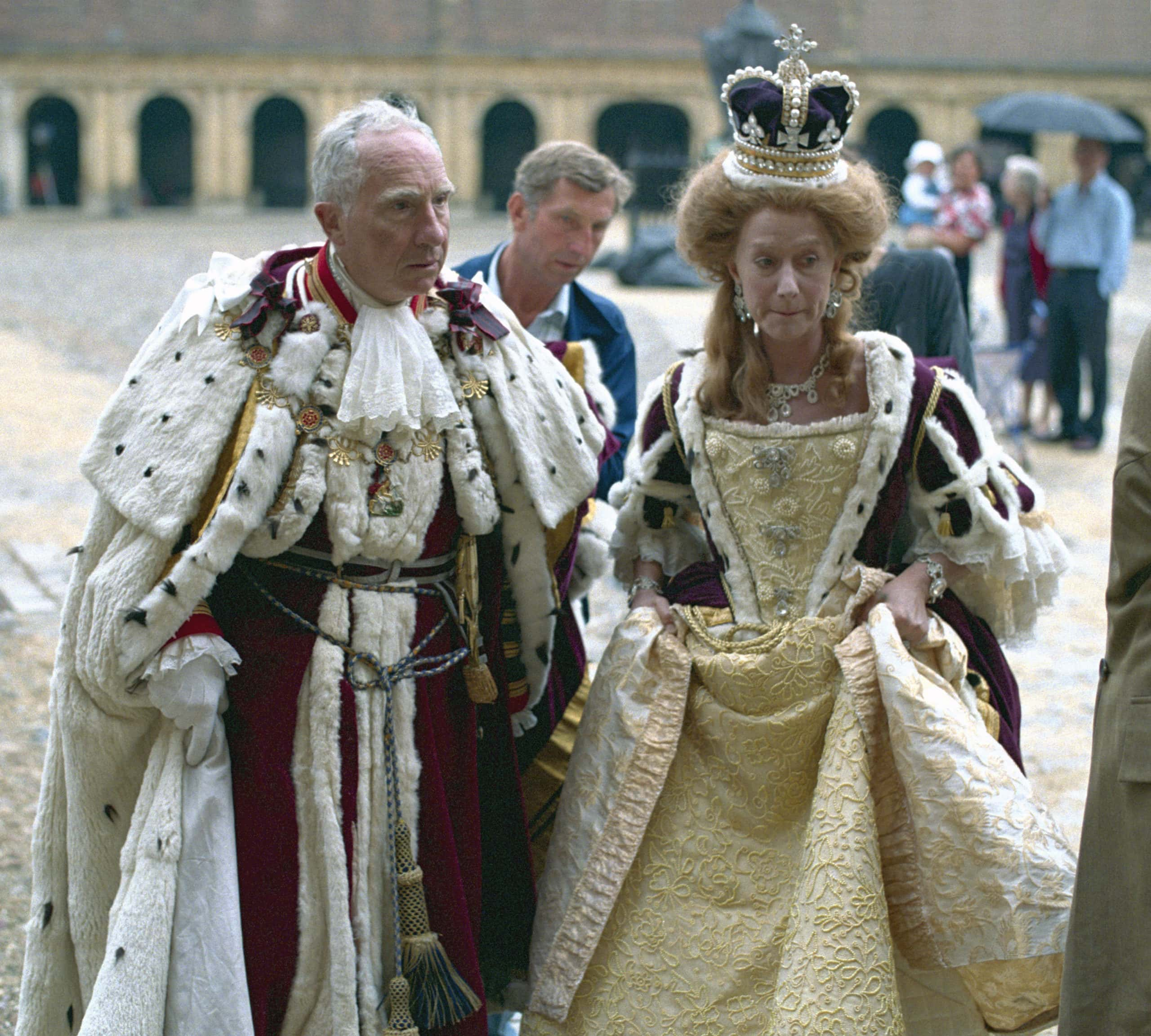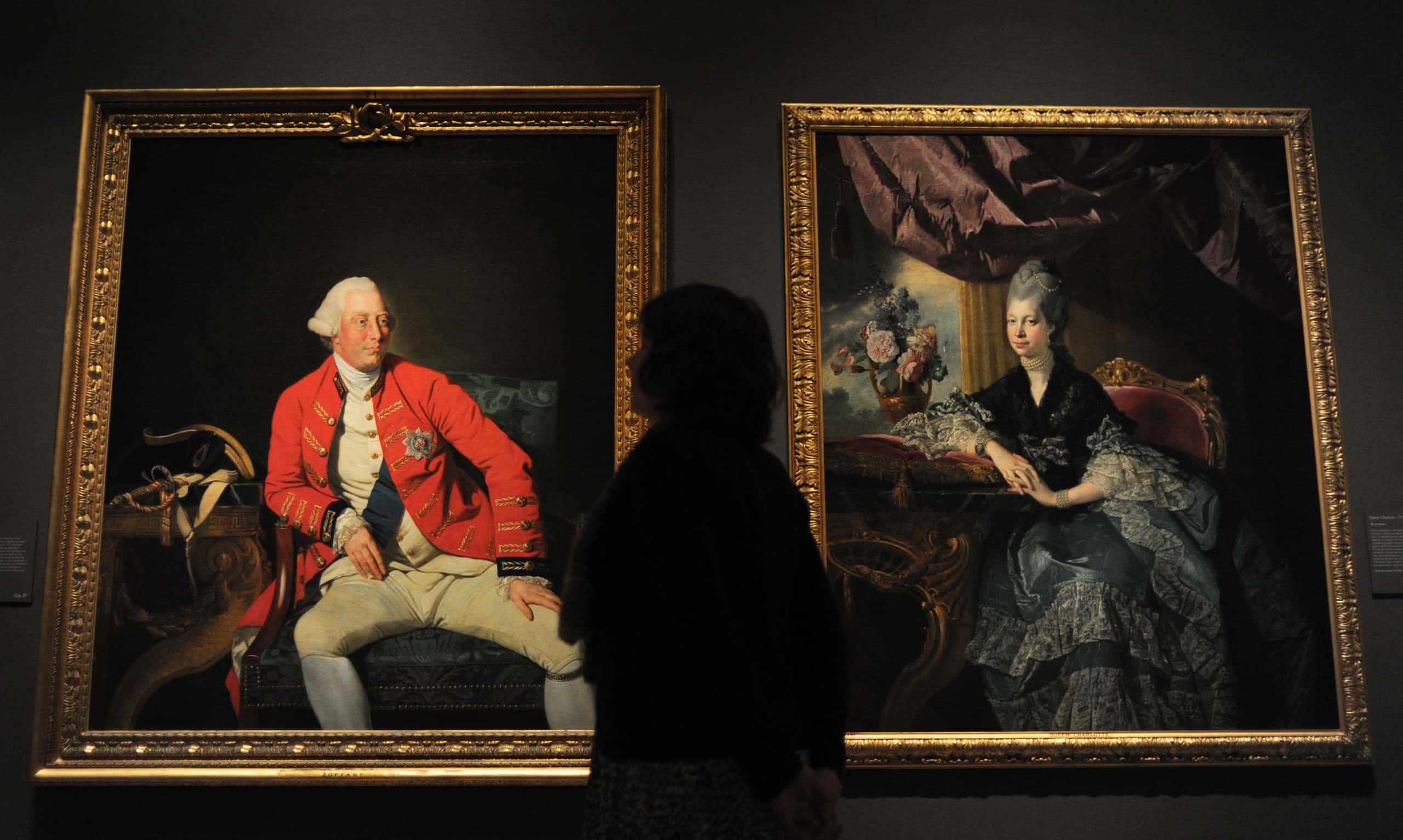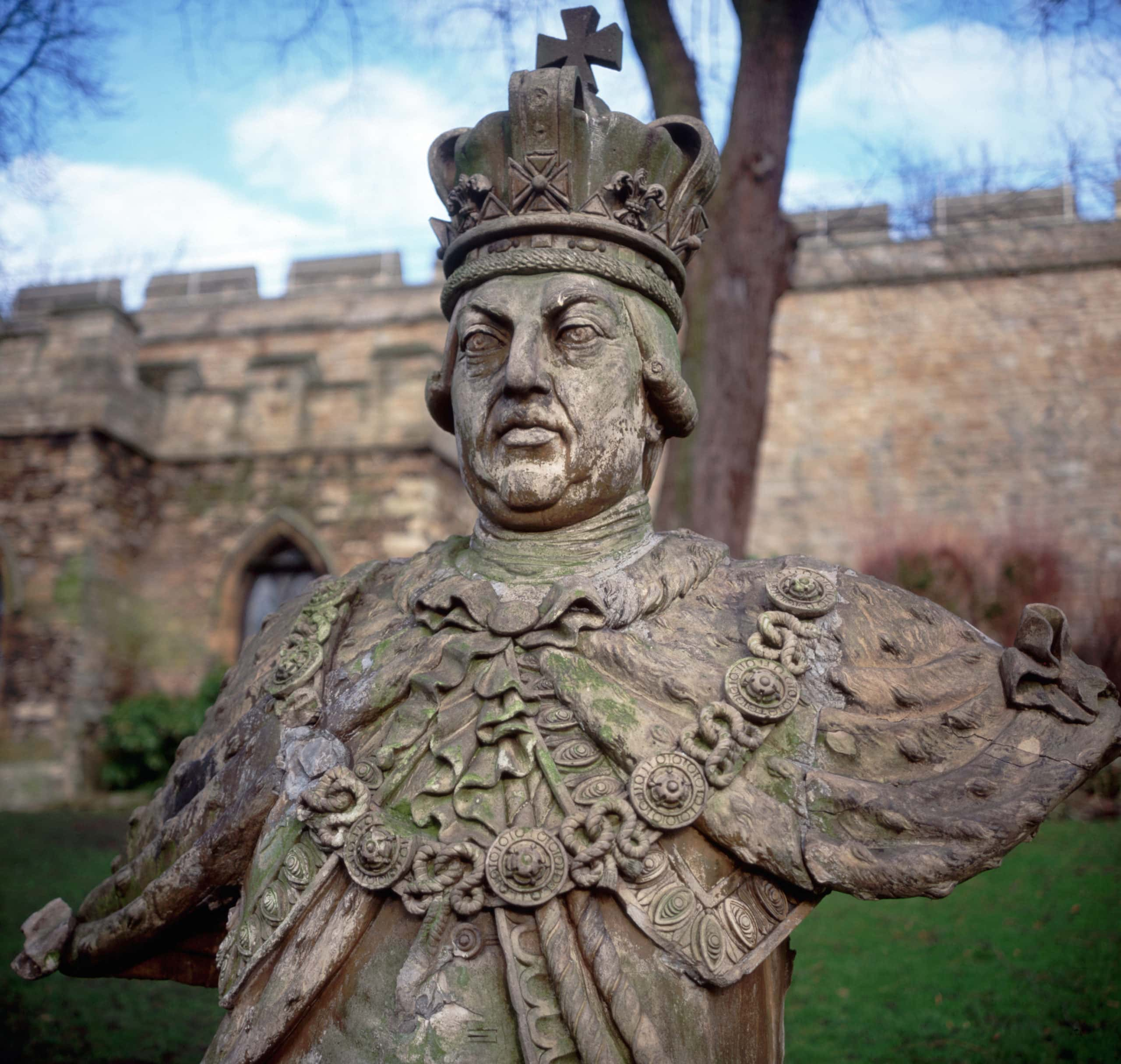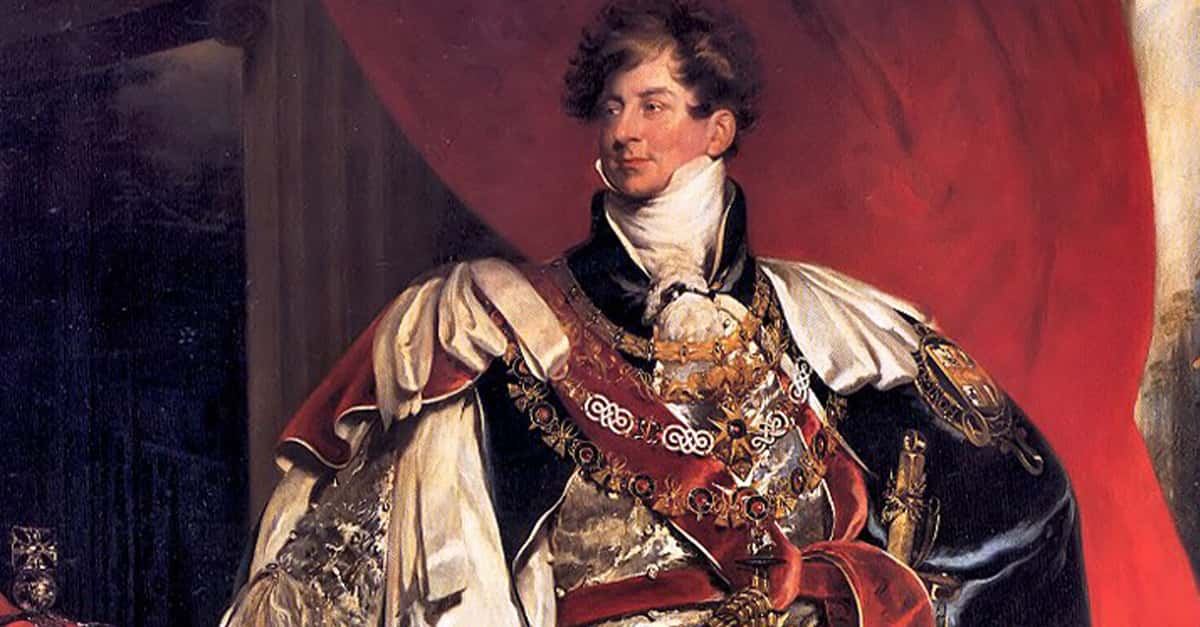The Mad King. The Man Who Lost America. Farmer George? There are a lot of things you could call George III, but boring certainly isn’t one of them. His reign was as scandal-packed as it was long, and it all led up to a seriously tragic end. As the leader of their enemies, the Americans villainized him, and his own subjects were quick to jump on the bandwagon. But was he really such a dire villain…or just a scapegoat? Dive into the twisted story of King George III and find out for yourself.
1. His Birth Was Alarming
When the future King George III came into the world, it caused a flurry of terror and panic. He was the firstborn son to Frederick, Prince of Wales, the heir to the British throne, and his wife Augusta of Saxe-Gotha—and he was two months premature. But, at that moment, his place in the birth order was the least of his family’s problems.
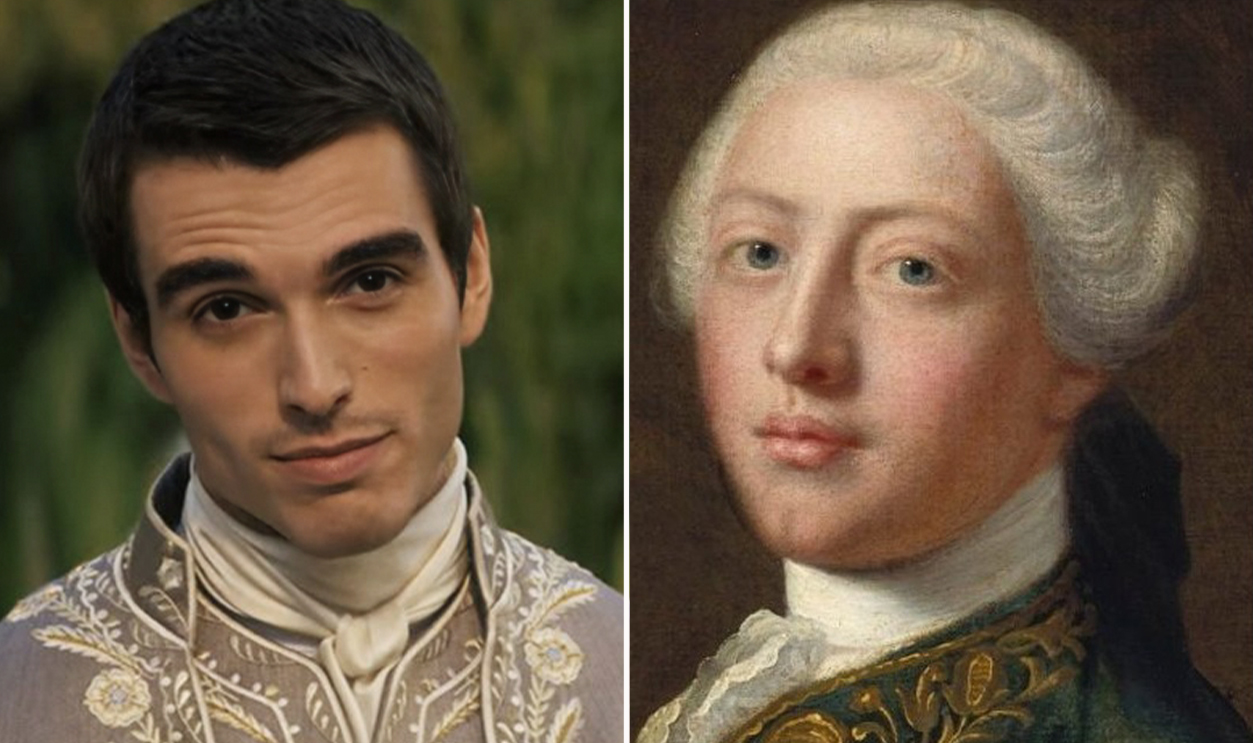
2. They Didn’t Know If He’d Make It
Since infant mortality was extremely high back then, George’s parents feared for his life—and for his soul. They brought in the Bishop of Oxford to baptize him on the very same day of his birth, worrying that he may not even make it through the night. Yet as the hours and then days passed it looked like, against all odds, he might just pull through.
Did this inauspicious and fear-stricken entry to the world serve as a dark omen for his reign? If you’re the type to believe in that sort of thing, well, the answer is a definite yes, as we’ll see.
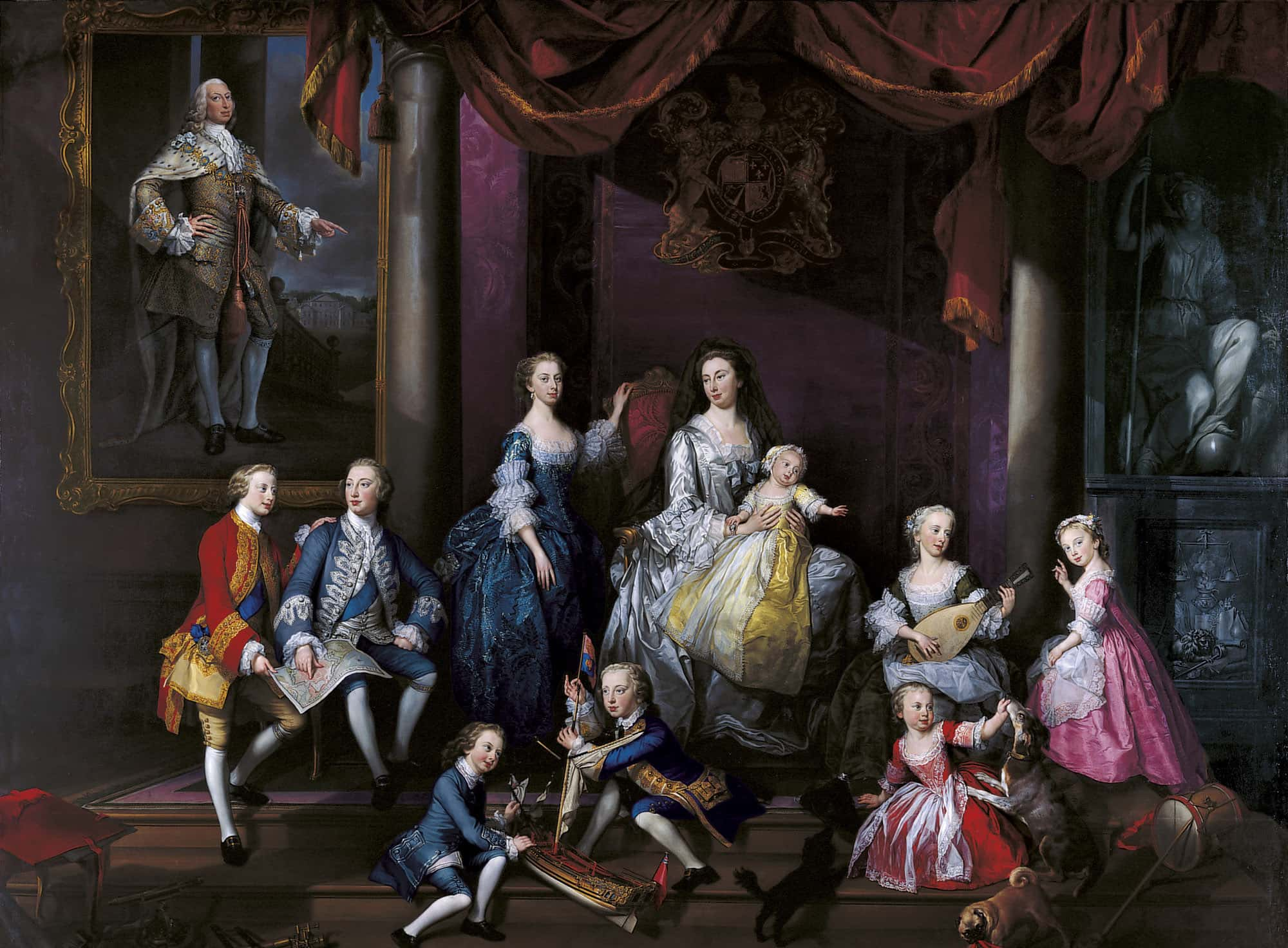 Wikipedia Augusta and her children
Wikipedia Augusta and her children
3. His Family Hated His Parents
George’s survival seemed like nothing short of a miracle—and it came at a time when his father Frederick definitely needed one. His grandfather, King George II, absolutely loathed Frederick, as did Frederick’s own mother. And while they didn’t mind their daughter-in-law, the Queen was suspicious of her. When Augusta first got pregnant, the Queen speculated that the child didn’t belong to Frederick.
So yeah, that’s the kind of fraught family dynamic George III came into—and it only got worse from there.
4. His Childhood Was Briefly Idyllic
Despite his family’s low opinion of him, Prince Frederick was a pretty good dad to George III, and made sure he had a high-quality and well-rounded education. George III was actually the first king to have science as part of his schooling. Yet still, the king didn’t seem to care much about the boy—but all that was about to change in an instant.
5. His Life Turned Chaotic
Just as George entered his teen years, a devastating tragedy completely upended his life. His father, Prince Frederick, met a sudden end—leaving George without a father, and the throne without an adult heir. As you can imagine, his grandfather King George II was all of a sudden super interested in young George, his education, and his plans for the future.
Now that he was next in line for the throne, the battle between George’s mother and his extended family became much more intense.
 Wikipedia George II
Wikipedia George II
6. They All Wanted A Piece Of Him
You know that thing where divorced parents try and vie for their kid’s love by spoiling them? Well, George was going through that, except it was his grandfather, a monarch, trying to get him to live at St. James’s Palace in the lap of luxury. And George’s mother? Well, she was having none of it. She worked with her confidant, Lord Bute, to keep young George under her watchful eye, and convinced him to stay with her.
But they weren’t the only ones fighting it out for George’s affection.
7. He Fell In Love
George was, after all, at the age where a young monarch’s attention turns to the ladies. But instead of getting out there like his father and grandfather once had, bedding fair maidens left and right, George took the pursuit of romance pretty seriously. When he first saw one of the court’s noted beauties, Lady Sarah Lennox, he fell for her—but he fell a bit too hard.
8. He Was Obsessive
When George heard a rumor that Lady Sarah Lennox and the Duke of Marlborough had a thing for each other, he got so depressed that he’d spend hours at a time alone in his room. He also stopped sleeping. George may have been 21, but he was seriously acting like an emo teen. He went to his mother’s advisor, Lord Bute, to ask for advice—but he didn’t exactly get the reaction he wanted.
9. He Was A Bit Of A Sucker
Lord Bute told him that marrying Lady Lennox wouldn’t be good for the country. Whether that was true or not, George took the Lord’s advice. Not only did this leave George heartbroken, but it also caused many in the court to wonder how Lord Bute had such a strong grip on the young prince. This all left King George II, as they say, shaken.
Soon, George’s nearest and dearest began to battle once again—and this time, each side was determined to be the one to choose his wife.
10. He Didn’t See It Coming
Sadly, the battle was a short one—as a brutal tragedy soon stopped it in its tracks. In 1760, King George II perished just as suddenly as his son had, leaving our boy George as the last man standing. At age 22, he took the throne at King George III. While he no longer had to deal with his grandfather’s and his mother’s factions vying for his favor, he was still vulnerable to those who wished to treat him like a puppet.
That’s not to mention the fact that he was single and desperately in need of an heir. King George III had to get moving, and get moving fast.
11. He Surprised Everyone
For a minute, it looked like George, now in possession of a little more agency, might go back to Lady Sarah Lennox. Lord Bute, who suspected that her brother might supplant him as the king’s most trusted advisor, panicked. He presented George with a series of potential German brides, hoping to keep his position in the king’s favor. Much to his surprise—and everyone else’s—it worked.
12. He Picked An Unlikely Queen
No one thought that Princess Charlotte Of Mecklenburg-Strelitz was even a contender for the position of queen. In fact, historical accounts like to mention that she was plain and had “no particular talent or striking personality.” But she came from a good family, didn’t seem to have political motivations, and, most important…she was at the right place at the right time.
George III basically plucked her out of obscurity, but he knew he was out of time, so he immediately proposed marriage. She accepted—and they were both in for a surprise.
 Wikipedia
Wikipedia
13. She Freaked Out
In 1761, Princess Charlotte and her entourage rolled up to London for the very first time. Upon realizing that not only was she going to lay eyes on King George III for the first time, but she was also going to marry him immediately afterward, the pressure overwhelmed her. Charlotte passed right out. Her ladies-in-waiting quickly revived her, and a dazed Charlotte met her man for the first time.
She completely freaked out and botched the whole introduction, leaving George cringing on her behalf. They were most definitely not off to a great start.
14. They Made It Work
It was too late for anyone involved to turn back, so they all put on a brave face and hoped that the worst was behind them. Charlotte turned on the charm that evening and swept George off his feet. They tied the knot later that night, turning their mutual nightmare into something of a fairy tale. George wasn’t the only one she won over, either, and by the end of the night, everyone was talking about how great she was.
However, one person was particularly hard to get through to…
15. She Was Furious
George’s mother, the Dowager Princess Augusta, had married his father expecting to one day become queen. That opportunity eluded her, but at least she had her son, right? Well, she saw the writing on the wall when he fell for his bride Charlotte. So, she began to pull a serious evil mother-in-law act. Augusta may not have been able to control her son, but she did everything in her power to keep her daughter-in-law down.
She even installed spies among the queen’s ladies-in-waiting—but her power-hungry ways would soon come back to bite her…
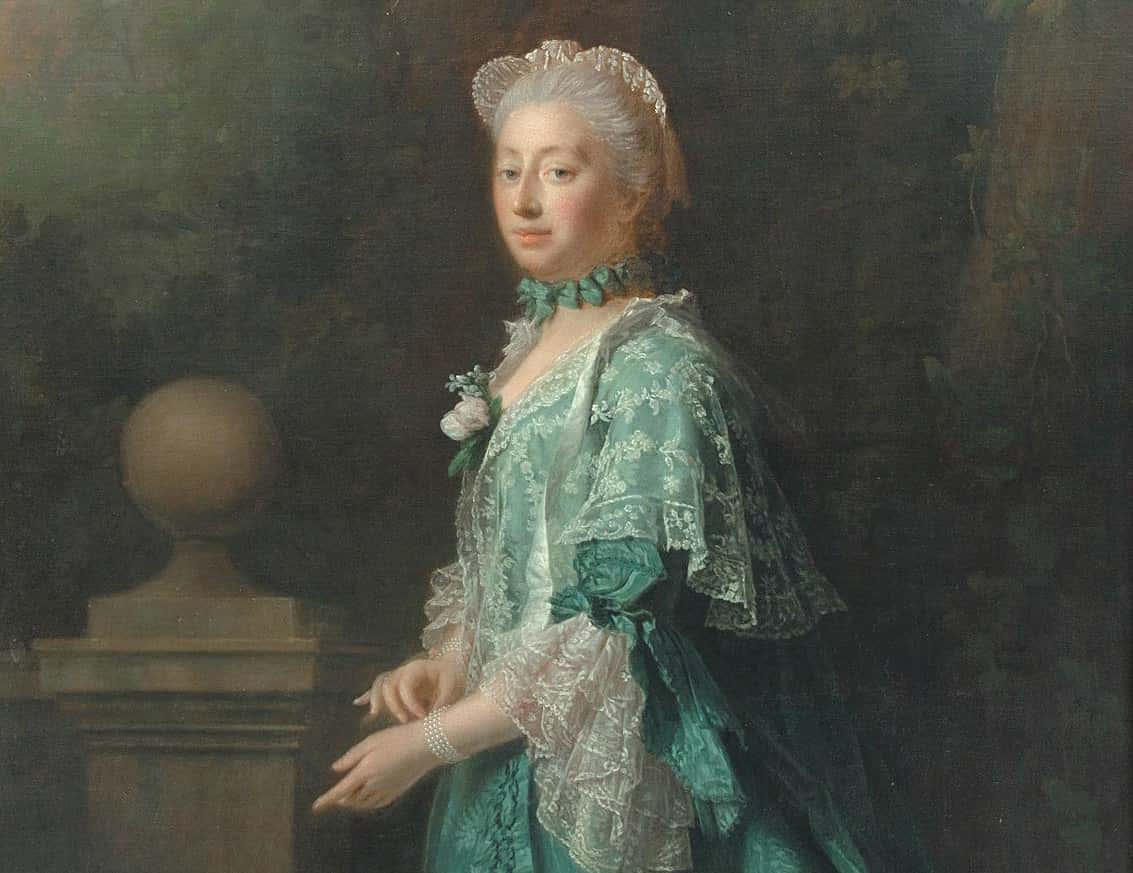 Wikipedia
Wikipedia
16. They May Have Been Keeping A Secret
It didn’t take long for scandals to take root in George III’s reign. Soon after his coronation, he had to deal with mortifying rumors about his mother. When Lord Bute schemed his way into the position of prime minister, people began to whisper that he and Princess Augusta were having an affair. The gossip shocked the court—and it became the first (but not the last) strike against the man George had, until this moment, trusted the most.
As if he wasn’t already dealing with enough…
17. He Was In The Wrong Place At The Wrong Time
George III had taken the throne at a particularly inopportune time. Britain was right in the middle of the Seven Years’ War, a massive conflict the likes of which the world had never really seen before. At first, the politicians in Parliament had accepted George, but when his old pal Lord Bute became Prime Minister, they turned on him.
The rumors about Lord Bute and his mother had done real damage to George’s relationship with the now-Prime Minister—but if he wanted to get out of the trouble he was in, they were going to need to work together.
18. He Just Wanted Out
By 1763, the conflict was bleeding the British dry—but luckily for them, the French were in even more dire straits. There was an armistice and talks of peace, with lenience toward their opponents in Spain and France. There was just one problem. People saw it as a weakness, if not a straight-out betrayal of Great Britain by the King and Lord Bute.
In one terrifying incident, a furious mob even descended on the king’s carriage and tried to attack him. Still, there was really no choice but for Great Britain to end things. Luckily, they had the upper hand.
19. He Got His Glory In The End
The end of the Seven Years’ War marked a decisive victory for Great Britain, who got all kinds of territory out of it, including large swathes of North America. It was from this moment in time that the infamous description of Great Britain as “a vast Empire, on which the sun never sets,” was coined. England’s colonists in America celebrated the victory…at least, they did at first.
20. He Made People Seriously Angry
Great Britain’s victory meant that the American colonists had way more land to work with. But, hey, as part of such a great empire, they wanted more. So, when George III issued the Proclamation of 1763, limiting settler expansion and protecting Native American territory, their reaction was brutal. They saw it as a complete betrayal, and they weren’t about to take it sitting down. George III didn’t know it yet, but he was in major trouble.
21. He Ended It With An Old Friend
Lord Bute had long been one of George’s closest confidants, but the fact that they couldn’t get anything done in government without causing controversy or scandal wore on their relationship. Eventually, they could no longer work together, and Bute resigned in 1763. George’s mother tried to get them to reconcile—after all, she counted Bute among her allies—but it was fruitless.
Once out of sight, Lord Bute was out of mind…and that meant that the King became the scapegoat for many of the decisions Bute had made as prime minister. It wouldn’t be the last time a PM screwed him, either.
22. He Kept Stepping On The Wrong Toes
Great Britain not only wanted to make up for all the money they’d lost, but they also needed to offset how much ongoing conflict with the Native population in the US was costing them. With the full support of the King, the next prime minister, George Grenville, came up with the 1765 Stamp Act—and it immediately set off a huge wave of controversy.
23. They Were Coming To Hate Him
The act instituted a tax on printed materials in the colonies, who saw it as a personal attack. They were absolutely outraged…and the king was, once again, in big trouble. After a ton of conflict and pressure, George III reluctantly agreed to appeal the Stamp Act. While the colonies celebrated his act and even erected a statue of him in New York City as a result, it would later come back to haunt him.
24. He Was Prolific
There was one place where George had plenty of success as a king. To put it modestly…let’s call it the production of heirs. Soon after his marriage to Charlotte, she and the king began cranking out kids at an extraordinary rate. No, seriously. They had 15 children, all but two of whom lived to adulthood. As far as birth rates go for that era, for royals…it was truly extraordinary. Despite their awkward start to things, George III and Charlotte had really made things work.
Not only did they actually love each other, but they’d also produced an heir and a spare (and then some). However, the pressures of his reign were beginning to wear on George.
25. He Lost It
In 1765, King George was temporarily struck with a mysterious “mental disorder.” His mother and her associates carefully monitored the ill king—while making sure to keep the full extent of the King’s illness a secret from his own wife, poor Queen Charlotte. The queen, who was beside herself with worry, was often found weeping throughout the palace.
But then, out of nowhere, he recovered. Things went back to normal—but unfortunately for George, normal meant tense, fraught, and dramatic.
26. His Family Was Scandalous
Just because he had a happy family at home didn’t mean that George had a happy extended family. George was a pretty straitlaced guy. He was very religious, and unlike his predecessors, he didn’t have any mistresses. His brothers, though, all participated in the family traditions of having multiple affairs and secret marriages to ladies the king did not approve of.
George even tried to introduce an act forbidding members of the royal family from getting married without the king’s permission. It was yet another half-cocked grasp at power that no one listened to—and that only served to erode confidence in the king.
27. The Tides Were Turning
Things were spinning wildly out of control, but George continued to place his faith in the parliamentary government. Now here’s where it really came back to bite him. Things were getting tenser and tenser in the colonies, and his subjects there were tired of paying duties and taxes when they had no representation back home.
In a now-classic blunder, George said “Forget about all that stuff…except for the duty on tea.” Well, maybe he didn’t use those exact words, but either way, it really teed the colonists off.
28. They Really, Really Hated Him
There’s one thing to know about British people, and that’s don’t mess with tea. No, really. The British really did see the ensuing Boston Tea Protest and the destruction of tea as vicious and unlawful. Before, the tension had existed mostly on the side of the colonies, and now, it was mutual. George’s role in all this caused the colonies to paint him as a tyrant—and they were just about ready to revolt.
29. They Took A Stand Against Him
You may be familiar with the next part of the story, but if you aren’t, here’s the short version. Thirteen British-American colonies were real tired of the way Britain was doing things, and they began to fight back. In July of 1776, they declared their independence from the British crown, and they had a lot of parting shots for George. They claimed he abdicated governing in America.
Thus began the American Revolutionary War. And even if you didn’t know the last part, chances are that you know how things went for ol’ George.
30. He Was On His Own
King George III valiantly tried to rally his inexperienced and unprepared ministers for a civil conflict—but then France got involved, further complicating matters. While the colonies had allies all over the world (namely, countries that Great Britain had previously teed off), all that the British really had were the loyalists. It was all falling apart before George’s eyes—and it was about to get way worse.
31. Nothing He Tried Worked
George’s ministers were begging him to let them quit the impossible job they were faced with. There was even a possibility that the colonies’ allies could take the opportunity to invade England. With what little power and resources he had left, George gathered 7,000 men to cross the Atlantic. Still, it was too little, too late.
After numerous losses, George had no choice but to accept defeat. It would come to be the incident that tarnished his entire legacy—but first, he had to deal with the aftermath.
32. He Finally Got A Win
After losing America, the British Parliament was in utter chaos. It shuffled through multiple prime ministers—few of whom George cared to work with—until he put his foot down. Through a series of machinations, he managed to get one of his allies, William Pitt the Younger, in as PM. And when we say younger, we mean it—Pitt was the youngest prime minister of Great Britain at just 24.
While some minor parliamentary messes followed, George at least finally had one of his own right where he wanted him. And considering the storm that was coming—he was going to need him.
33. He Was Surprisingly Popular
Against the odds, the people of Great Britain came to like Pitt and George as a combo. Pitt was an energetic leader and George’s subjects liked the fact that he was a family man—but there was another, more tragic reason for their warmth. The King and his wife lost two sons, one after the other, in 1782 and 1783. Prince Alfred was just one year old, and Prince Octavius three.
He felt the loss heavily, and it became yet another strain on his already fragile health. Soon…it all fell apart.
34. He Fell Apart Again
In the summer of 1788, King George had another breakdown—and this time, it was much, much worse. He spent much of that period in a complete manic state. He locked his wife and daughters in a room with him and kept them up for hours, talking. Eventually, they were able to convince him to go to Cheltenham Spa to recuperate. Sadly, his time there did not help.
When he returned home, things got even worse.
35. His Symptoms Were Terrifying
In November of 1788, George’s mental state deteriorated even more. He would talk for hours on end, leaving him foaming at the mouth and dehydrated. While he would sometimes repeat himself, those close to him reported that he got more creative and used a wider vocabulary during other episodes. There was even an anecdote about him introducing himself to a tree, thinking it was the King of Prussia.
His family struggled to keep it a secret…but within their ranks, someone was plotting.
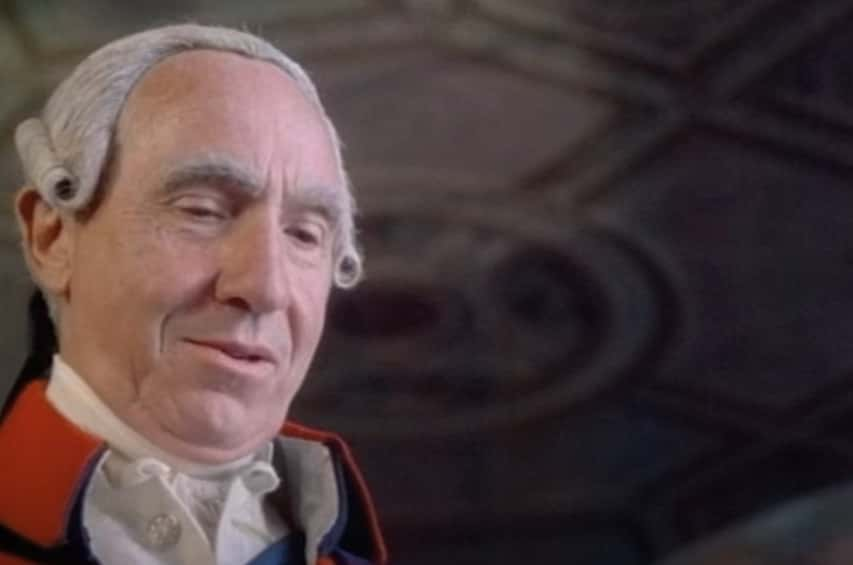 The Madness of King George (1994), The Samuel Goldwyn Company
The Madness of King George (1994), The Samuel Goldwyn Company
36. His Family Plotted Against Him
One doctor who came to visit the king didn’t make time to speak to Queen Charlotte and no one alerted her to his arrival. This made her realize a devastating truth—someone was trying to cut her off from her husband. Tragically, that “someone” turned out to be her eldest son, the Prince of Wales. He suspected that Charlotte wanted the throne for herself, while she believed that he might try and have his father declared insane to force his accession.
And while this struggle for power was going on, doctors were struggling to help the king.
 The Madness of King George (1994), The Samuel Goldwyn Company
The Madness of King George (1994), The Samuel Goldwyn Company
37. Their Treatments Were Horrific
Doctors knew little about mental disorders at that time, and so they had no idea what to do to help King George. Eventually, they came up with a course of treatment—but unfortunately, what they chose to do to him was utterly disturbing. They would forcefully restrain him until he calmed down or stopped talking, and they also came up with a number of caustic mixtures to help balance his “evil humors.” And that’s not to mention the bloodletting!
It was excruciating—but if he’d only known what was going on while he was incapacitated, he’d have been even more broken.
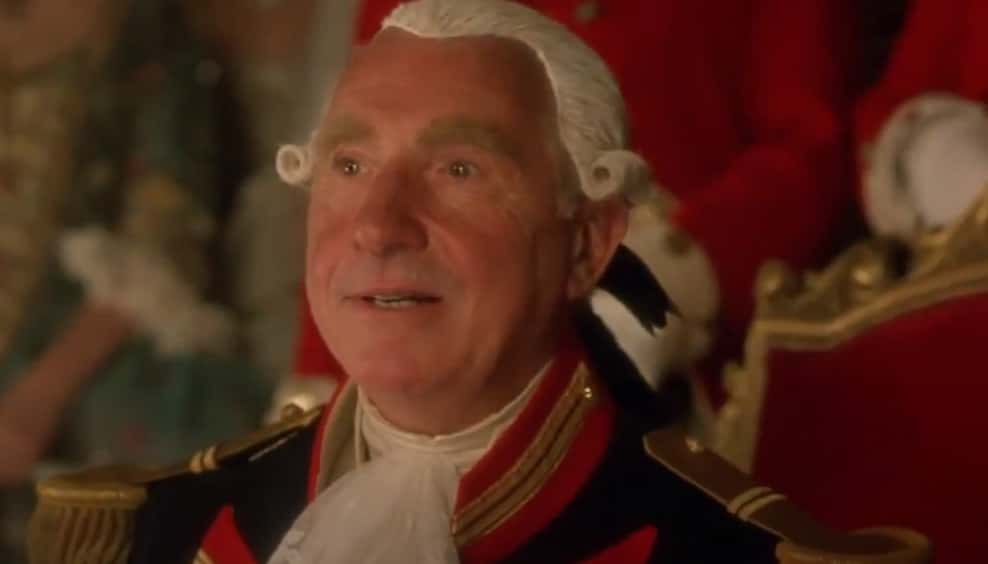 The Madness of King George (1994), The Samuel Goldwyn Company
The Madness of King George (1994), The Samuel Goldwyn Company
38. He Made A Power Play
During the time that George was unable to rule, Parliament struggled to come up with a solution to the problem. The King’s eldest son, George, Prince of Wales, was already 26 and as we know, seriously ambitious. The prime minister’s rival, Charles James Fox, argued that the Prince should definitely act as regent.
Pitt, who didn’t get along with the boy, argued that Parliament should choose a regent. But then, just as Fox and the Prince were about to get their way, they got a surprise.
39. He Came Back From The Brink
King George made a sudden recovery from his illness and returned to his post. He and Pitt, the prime minister, were working together successfully and both were extremely popular. There were no two people this annoyed more than Fox, Pitt’s nemesis, and the Prince of Wales, who had completely turned against his father. Much to their frustration, King George seemed more in command of both his power and his mental faculties than ever.
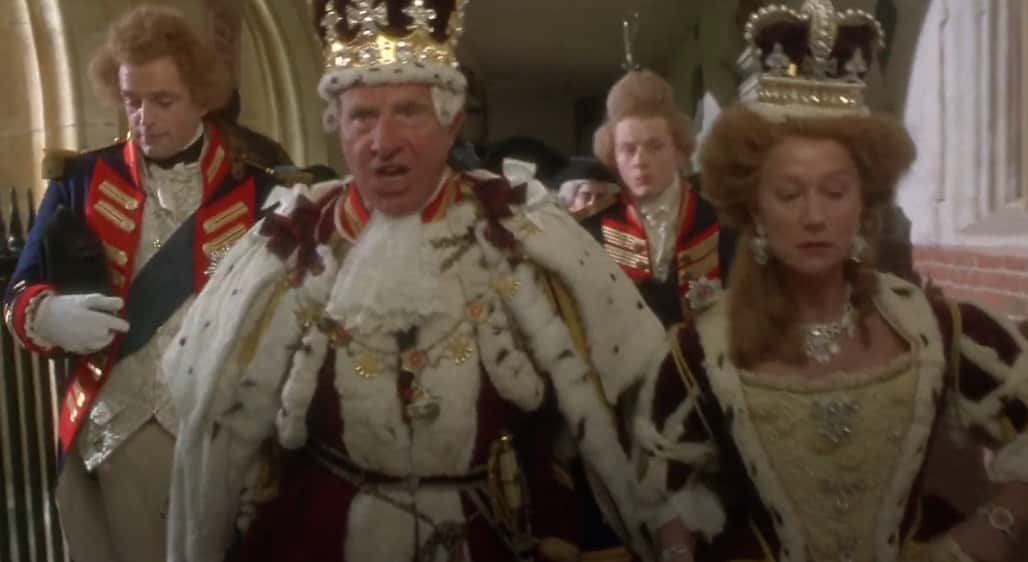 The Madness of King George (1994), The Samuel Goldwyn Company
The Madness of King George (1994), The Samuel Goldwyn Company
40. He Was An Understanding Guy
One of the reasons why people liked him so much? Well, George (understandably) displayed a lot of sympathy toward the mentally ill. Three different assailants attacked the King between 1786 and 1800 with one even trying to shoot him. Each attempt was unsuccessful and each perpetrator was clearly unwell. The king’s reaction shocked everyone. He was lenient and understanding with each of them, especially since the attacks weren’t political.
In fact, after one attack, he was so unbothered that he even fell asleep afterward. But that doesn’t mean his life was without its stresses.
 The Madness of King George (1994), The Samuel Goldwyn Company
The Madness of King George (1994), The Samuel Goldwyn Company
41. He Had Wins And Losses
For every success in his reign—like when he signed “An Act for the Abolition of the Slave Trade” in 1809—King George had to deal with some tribulation, like the French Revolution. While at first, many of the European countries came together to denounce the revolutionaries, eventually they all left Great Britain standing alone in opposition to France…and Napoleon Bonaparte.
And when it comes to annoying situations…well, this one was like a swarm of mosquitos on a humid day.
42. He Lived Under Threat
Many expected Napoleon to attempt an invasion, and the looming threat weighed heavily on everyone involved for months on end. The trouble with the French even caused a rift between George and his ally, William Pitt. The stress got to George, and he began to suffer brief relapses of his mental illness. Still, he was managing to outlast even the most unexpected foes…
43. He Lost A Friend And An Enemy
After various power struggles, Pitt came back into power right around the time that George recovered from one of his episodes. Pitt attempted to bring Fox into the fold, only for George to reject the idea. This backfired spectacularly. Many in the Parliament saw it as unfair and turned against the King. Other political battles took their toll on everyone involved.
William Pitt died at just 46, and Charles James Fox followed nine months after. Against all odds, George was once again the last man standing—but you can’t cheat fate forever.
44. His Favorite Daughter Died
After losing one ally and one foe, King George found himself standing alone, mostly in opposition to the men in government. He was still enjoying the height of his popularity—and before he had any chance to mess with Parliament and ruin it, tragedy struck. In November of 1810, George lost his youngest and most beloved child, Princess Amelia.
She passed on after a long battle with measles at just 27. It was at this moment that everything began to really unravel for King George.
45. Her Friend Turned On Him
Shortly after losing his daughter, George experienced an absolutely brutal betrayal. One of his supporters—and Amelia’s closest friends—had completely messed up in his position of Paymaster of the Marines and was left owing the crown £250,000. Disgraced, he later attempted to blackmail the King and Queen, claiming he was going to expose some of Amelia’s letters.
It added insult to the injury of losing his daughter—and frankly, the rest of his kids didn’t exactly help.
 The Madness of King George (1994), The Samuel Goldwyn Company
The Madness of King George (1994), The Samuel Goldwyn Company
46. He Was Seriously Stressed
After all these stresses, King George’s health began to fail him yet again. On top of his deteriorating mental health, George was dealing both with cataracts that left him nearly blind and a painful case of rheumatism. But more than anything else, it was the loss of his daughter that really broke him.
47. He Was Losing His Grip
King George III grieved for his daughter intensely. There were tears and a constant sense of melancholy—but as he lost his mind, his grief took a disturbing form. He would make heartbreaking pleas for Amelia, begging for her presence in bouts of insanity. At other times, George would speak to her as if she was in the room or would claim that she was visiting family in Hanover.
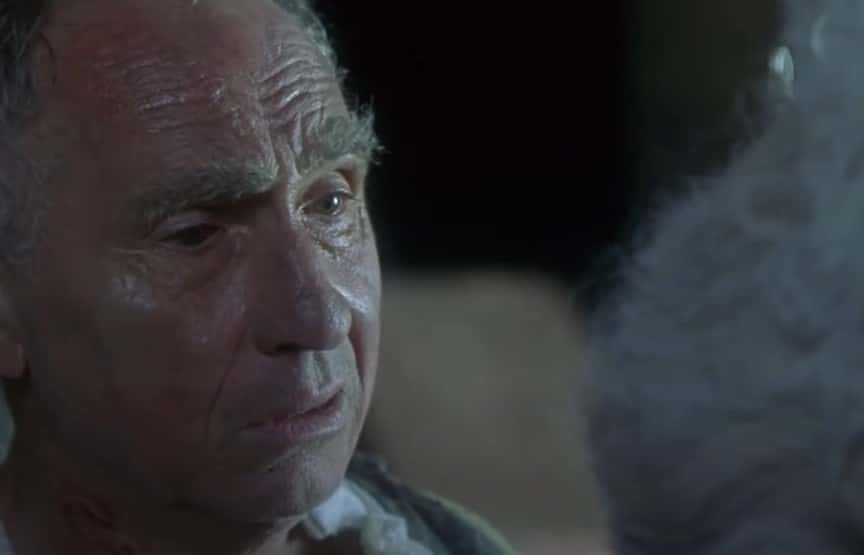 The Madness of King George (1994), The Samuel Goldwyn Company
The Madness of King George (1994), The Samuel Goldwyn Company
48. It Was The Final Nail In The Coffin
George III, his court, his government, and his family were at a loss over what to do. For a while, it even looked like he might recover—but the King knew in his heart that the loss of Amelia had broken him forever. In 1811 he finally faced up to it, signing an act that named his eldest son, the Prince of Wales, as his regent. He had given up on his reign—but his story wasn’t over yet.
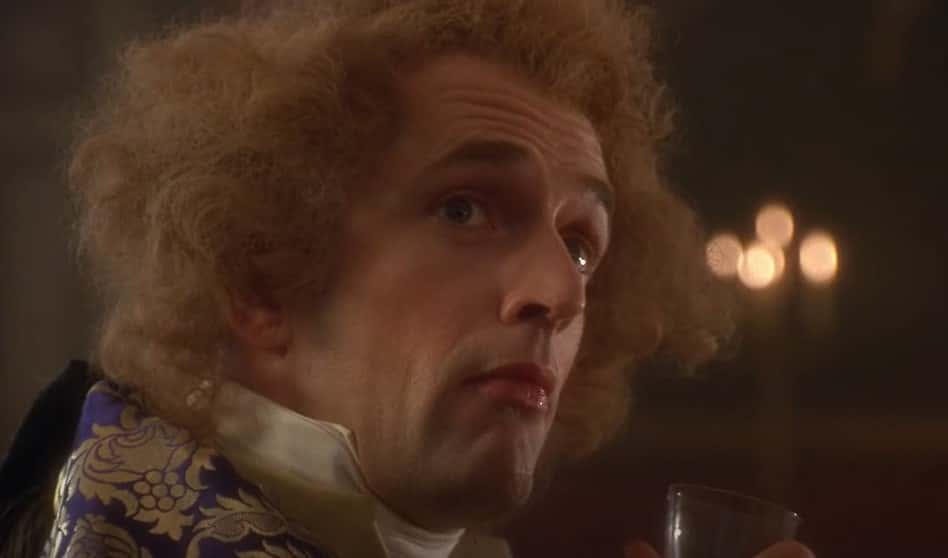 The Madness of King George (1994), The Samuel Goldwyn Company
The Madness of King George (1994), The Samuel Goldwyn Company
49. His Family Fell Apart
With their brother in power and their father and mother completely out of it, the rest of George’s family just…drifted apart. The princesses in particular had lived through an utter nightmare, and they distanced themselves from their parents. The Prince of Wales gave them each an estate, which they happily agreed to.
They left Queen Charlotte alone with just her mad husband—and as you can imagine, it was no picnic.
50. He Lost His Beloved Wife
Sadly, caring for the King and occasionally stepping in to help the Prince of Wales act as regent took its toll on Charlotte’s health. In 1818, she passed on at the age of 74 with her children by her side. King George was still holding on, but just as losing his favorite daughter had broken him, the queen’s loss had a devastating effect.
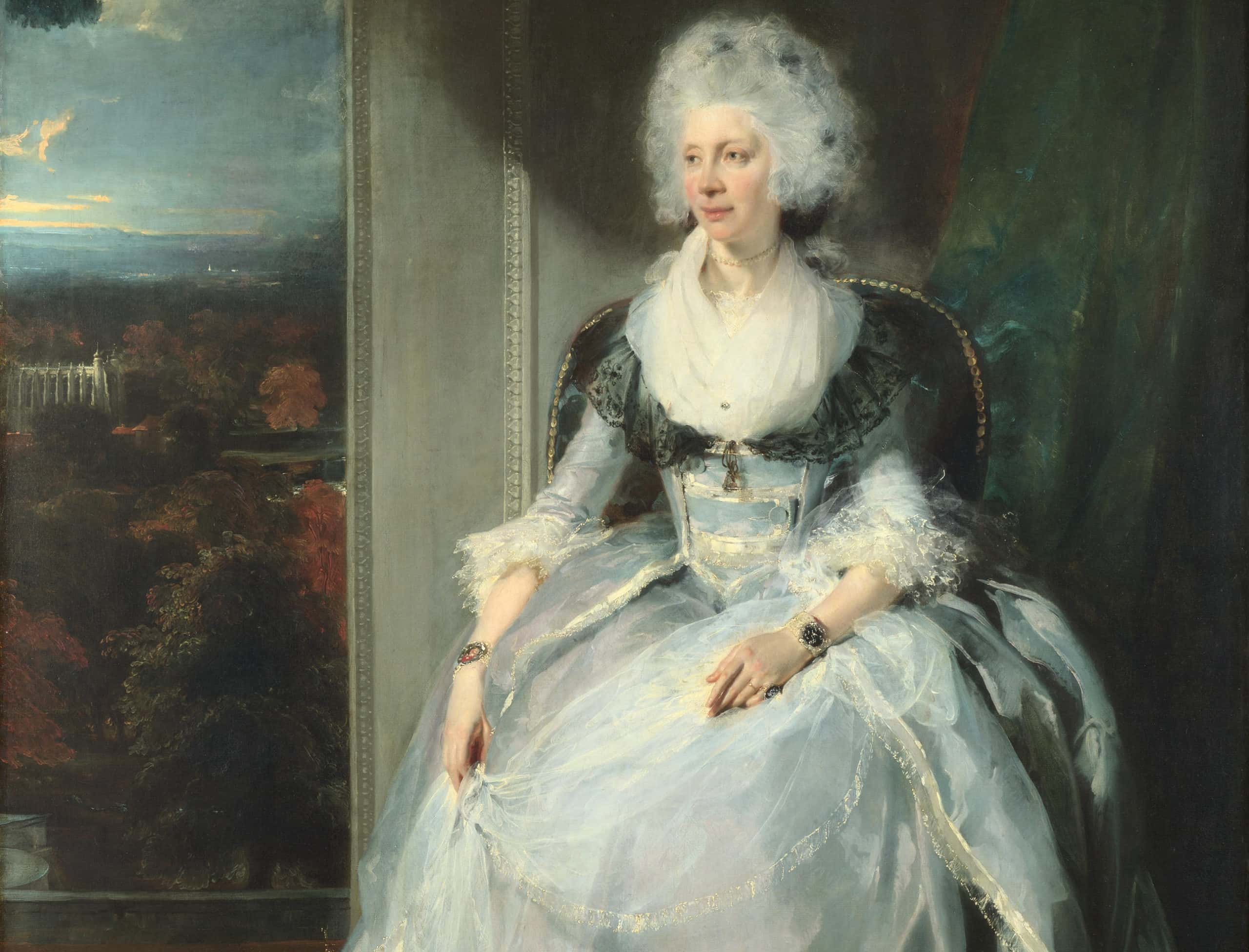 Wikipedia
Wikipedia
51. He Finally Faded Away
By the time his wife was gone, the King had more or less become completely mad. Without Charlotte’s care, he deteriorated rapidly. In a tragic twist, the King never truly understood that Charlotte was gone forever. His mind had deteriorated so much that he couldn’t comprehend that his wife would never again be by his side. Perhaps it was a kindness when George himself followed her two years later, dying in 1820 as a shell of his former self.
It was a truly tragic ending to their roller-coaster story—but there were still many questions about what had caused the king to deteriorate so rapidly and dramatically.
52. They Tried To Figure Out What Had Plagued Him
As doctors began to gain a better understanding of mental illnesses in the years after King George III’s passing, many speculated about what could have caused his bizarre fits of mania. While some suspected porphyria, a genetic blood disorder—and we all know how much royals are inclined to genetic disorders, for whatever reason—others have speculated that he may have suffered from bipolar disorder.
But then, another possibility revealed itself.
53. Someone May Have Poisoned Him
For centuries, the true cause of King George’s health problems was unclear—until 2005, when scientists examined some of his hair. When they tested it, they found a surprisingly high amount of arsenic in it. Arsenic could be a potential cause for his mania. But where did it come from? Did he accidentally come into contact with it…or had someone poisoned him?
The answer is unknown—but it’s definitely a historical mystery that I’d love to know the answer to…


